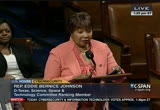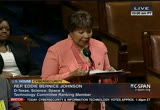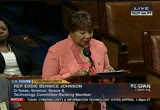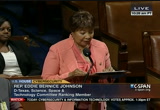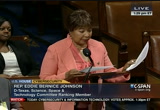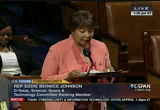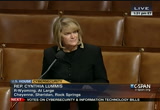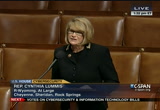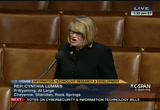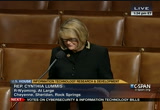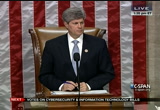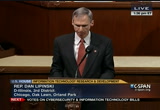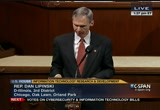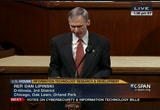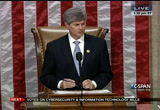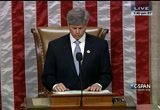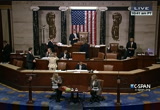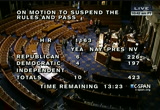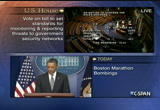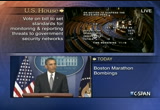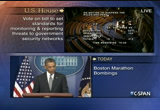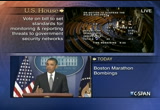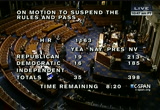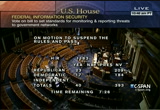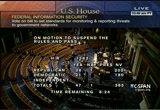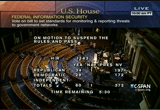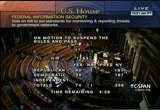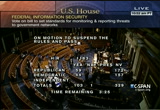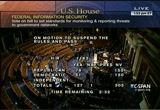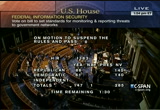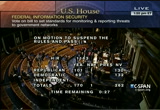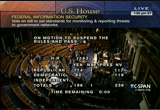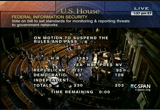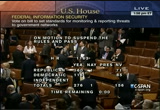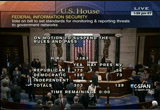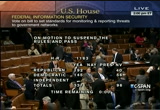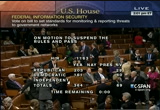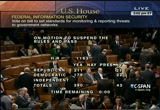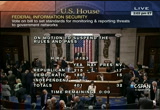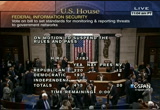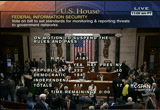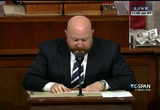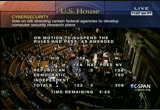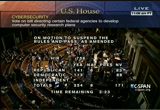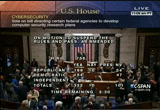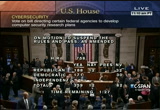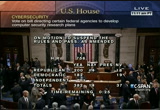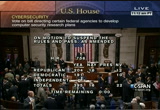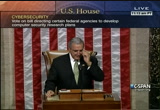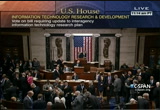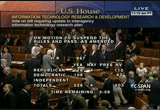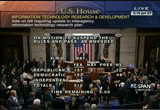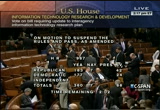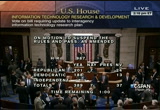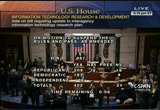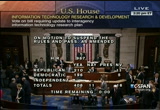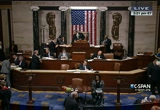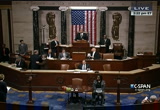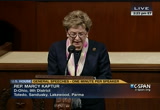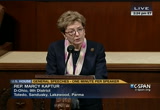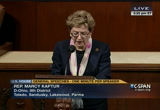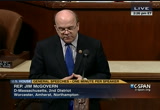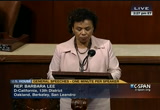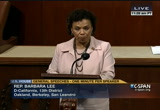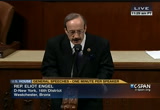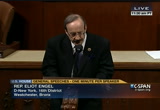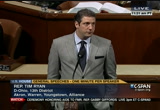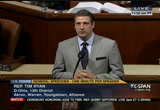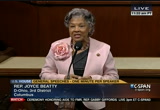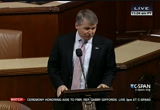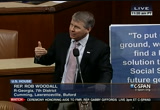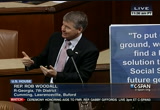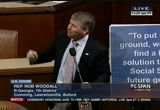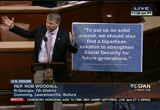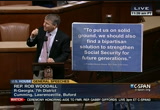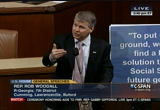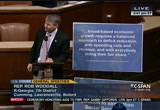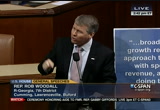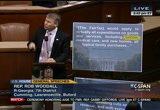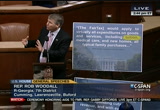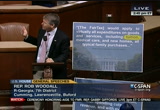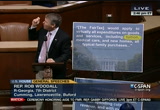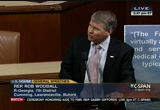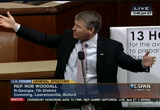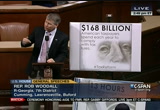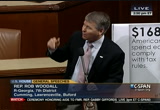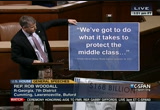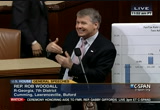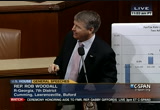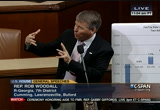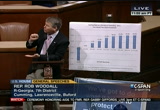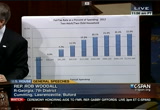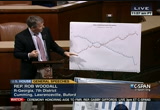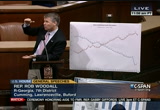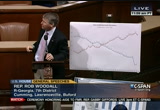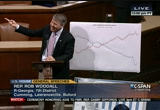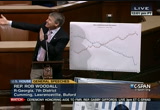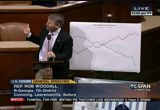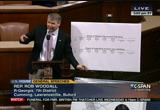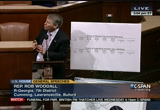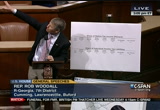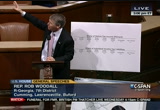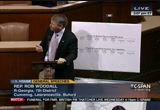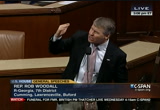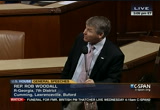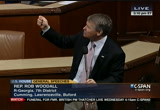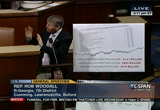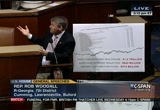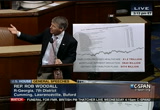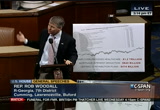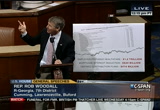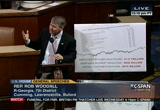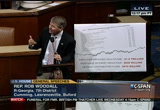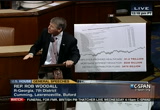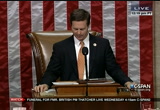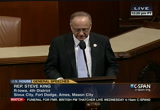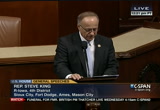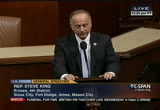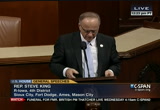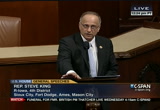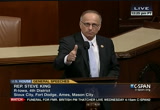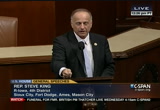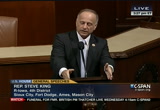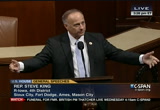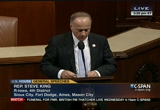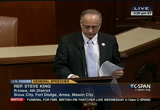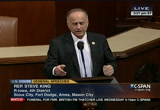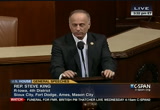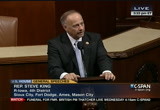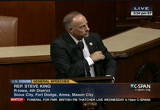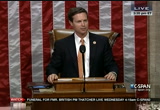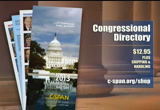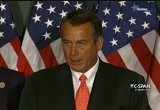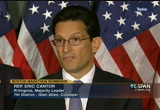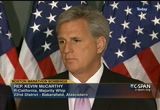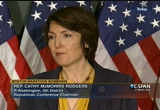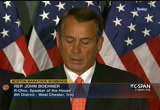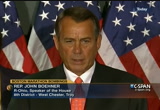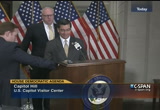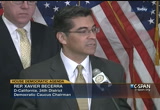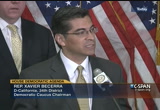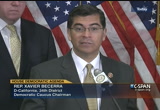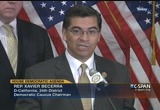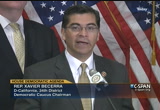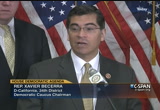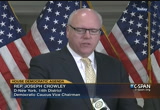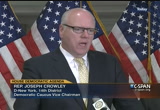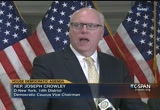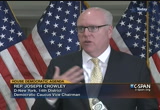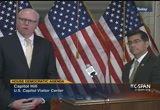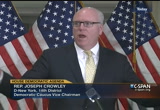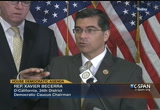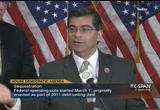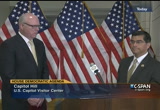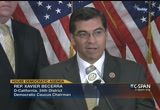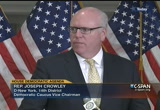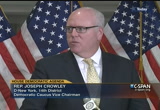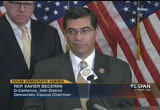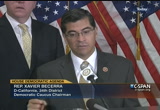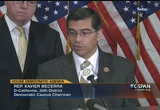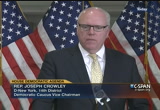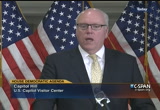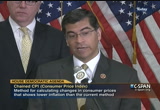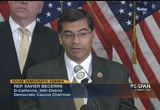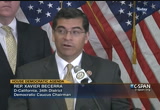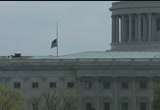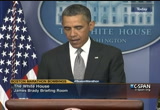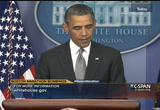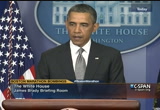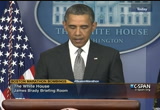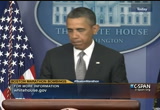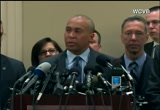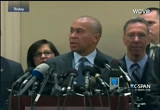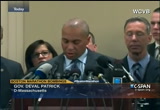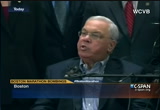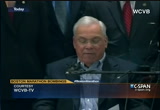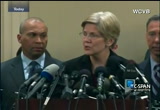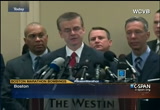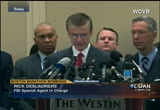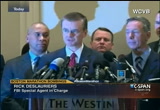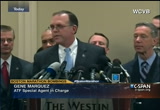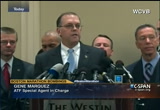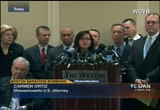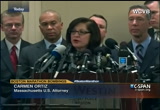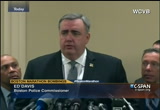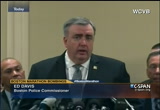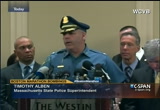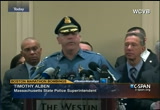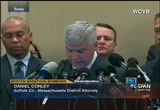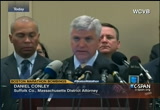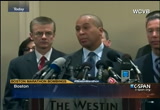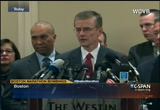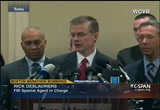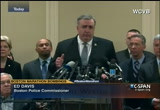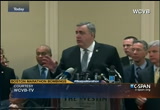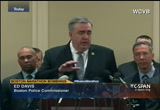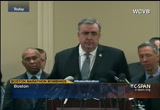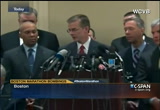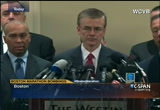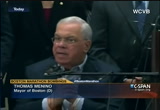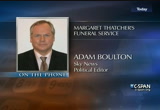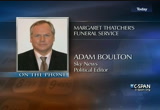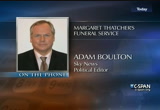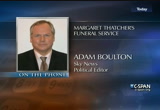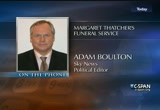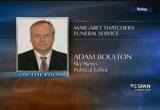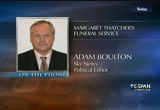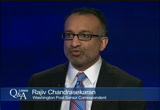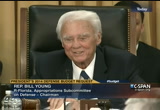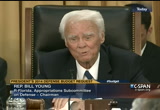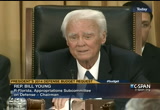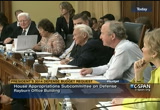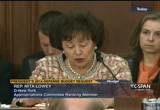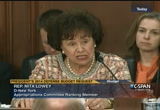tv Public Affairs CSPAN April 16, 2013 1:25pm-5:00pm EDT
1:25 pm
recognized. ms. johnson: thank you, mr. speaker. i yield myself such time as i may consume. the speaker pro tempore: the gentlewoman is recognized. ms. johnson: i rise in support of h.r. 967, the advancing america's networking and information technology research and development act of 2013. h.r. 967 is a good bipartisan bill which i was pleased to join mrs. lummis from wyoming and mr. hall from texas in introducing. h.r. 967 is largely based on a 2009 house-passed bill that was ntroduced by then-chairman gordon and ranking member hull. but this has some updates and reflects changing to the -- changes to the information and technology landscape as well as policy and management recommendations made by an outside panel of experts charged with evaluating nitr-d
1:26 pm
program. the program involves a collaboration of 15 federal resedge and development agencies, each contributing its own unique expertise and effort. to ensure that we make most effective use of our federal r&d resources and remain a leader in these fields. h.r. 967 requires that all 15 agencies come together to develop and periodically update a strategic plan for federal invest. s in -- investments in i.t. r&d. h.r. 967 will increase support, calls for increased support for large scale long-term interdisciplinary research in i.t. that will help us tackle national challenges such as improving the effectiveness and efficient soif our health care and energy delivery service systems. the bill also promotes
1:27 pm
partnerships between the federal government, academia, and industry to foster technology transfer. in particular, i'd like to ghlight h.r. 967's role in ensuring that the education of the future n.i.t. work force remains as -- an important component of nitr-d programs. i am hearing every day from large and small companies alike that the demand for skilled i.t. professionals is much higher than the supply. we hear this same mess a -- message from university faculty who tell us their computer science graduates are snatched up the moment they graduate, regardless of the health of the overall job market. this gap between supply and demand exists despite the fact that these jobs are among the highest paying and the most stable jobs in our economy today. it is imperative that we encourage more young americans n.i.t. e studies in the
1:28 pm
fields. in particular because of the stark racial and gender gaps we see in the programs, it is imperative that we encourage more young women and students of color to enter these fields. we simply won't be able to remain a global leader in these mportant fields without more -- with more than 50% of our nation's brainpower sitting on the sidelines. h.r. 967 doesn't go as far as i would like it to go in addressing these challenges but it does show the need to educate more students in n.i.t. fields and provide the necessary authority for the agencies to pay an important and appropriate role here. and finally, i would be remiss not to mention that nitr-d program serves as a coordinating and planning umbrella for all unclassified
1:29 pm
federal cybersecurity r&d. our committee addressed specific needs in cybersecurity , r&d separately in h.r. 756 but in doing so, we made sure that both the intellectual and financial resources for cybersecurity r&d are appropriately integrated with the rest of the federal n.i.t. portfolio. information security r&d should not take place in an of itself. it bears on all networking and information technologies. in closing, n.i.t. technologies cut across every sector of our economy and our national defense infrastructure. our relatively modest 20-year investment in nitr-d programs has contributed immeasurably to our economic and national security by enabling innovation and job creation in the n.i.t. and providing american students with the skills to fill these
1:30 pm
jobs. let's re-authorize this program today and ensure that it remains strong. i want to thank my friend, mrs. lummis, for reintroducing a bipartisan bill once again in this congress and i also would like to thank my staff and in sokolo for their hard work on this bill and i urge my colleagues to support h.r. 967 and reserve the balance of my time. the speaker pro tempore: the gentlewoman reserves, the gentleman from texas is recognized. mr. smith: i yield five minutes to mrs. lummis the sponsor of this legislation and who chairs the subcommittee of the science, space and technology committee. the speaker pro tempore: the gentlewoman from wyoming is recognized for five minutes. mrs. lummis: thank you, mr. speaker. i want to start by thanking chairman smith and ranking member johnson for their support in bringing this bipartisan legislation to the floor. you know, i have found since being on the science committee that it is an rook anymore-rich
1:31 pm
environment and mr. speaker, i'm an acronym challenged individual, so i'll be talking about the network and information technology research and development program. in the future i'll call it the program. it's the federal government's main research and development effort in unclassified networking, computing, software cybersecurity, and related information technology. research conducted under this program has led to scientific growth and innovation in several areas, including technologies in science, engineering, and medicine, computer-based education and training, and near real time weather forecasts which is really important in my state of wyoming. currently 15 federal agencies are contributing members to the program and even more
1:32 pm
participate. so h.r. 967, the bill in front of us, does two things. it updates the high performance computing act of 1991, and it re-authorizes the program to advance our nation's networking and information technology research and development. it's the digital age, mr. speaker. advances in networking and information technology continue to transform our quality of life , our economy, u.s. competitiveness, and our national security. this bill provides the coordination necessary for the united states to respond to rapid changes in these areas. it encourages innovation, and it protects our economy. my home state of wyoming is best known for its stunning mountains and open spaces. but not long ago wyoming also became home to a supercomputing center. it houses one of the world's most powerful supercomputers.
1:33 pm
mr. speaker, it makes a mind-boggling number of computations every second, and it's sponsored by the university coalition on spheric research, which sponsors the national center on atmospheric research, and so it's partially funded by the national science foundation, which is the taxpayers. so they help fund it. nd these computations neighbor world leading research projects in areas including spheric and geosciences. so this bill facilitates work in these fields ranging from research being conducted at the supercomputing center, to big data, and i mean big data, in cybersecurity as well. h.r. 967 implements several recommendations of the 2007 and 2010 president's council of advisors on science and technology assessment, to improve government coordination
1:34 pm
and planning with input from policy and technical experts. it adjusts research and development portfolios so we are focusing less on short-term goals and more on really long-term goals. now, specific to cybersecurity, the program includes research and development to detect, prevent, and recover from actions that compromise or threaten computer and network face systems. you just heard from congressman mccaul just moments ago, some of the specific examples of the real threats that are directed at computer networks. re-authorizing this important program -- program is an important step. i thank the chairman. i urge my colleagues to support the bill. i yield back the balance of my time. thank you, mr. speaker. the speaker pro tempore: the gentlewoman yields back her time. the gentleman from texas reserves. the gentlewoman from texas is recognized. ms. johnson: mr. speaker, i yield five minutes to the gentleman from illinois, congressman lipinski. the speaker pro tempore: the
1:35 pm
gentleman from illinois is recognized for five minutes. thank you, mr. speaker. i thank the gentlelady for yielding and for her work on this legislation. i'd also like to thank chairman smith and chairwoman lummis for all their work on this bill. it's been nearly four years since we last re-authorized and updated an r&d program and it's time we get this job done. again the house on this bill has passed legislation since that time, but we need to get this done today here and get this through the senate and the president's desk. the program evolves from the high performance computing act in 1991 which funded the development of mosaic. the first commercial web browser which made the internet sueser friendly -- user friendly and led to the explosion in 1990. this innovation was created by a
1:36 pm
team of programmers at the national center for supercomputing applications at the university of illinois. ask theef aside i would ncsa at champaign for the launch of the blue water supercomputer, one of the most power supercomputers in the world, developed there at the university of illinois. but mark, one of the lead programmers on the original project that created mosaic, and the founder of netscape, summed up the importance of the investment in the research by saying, if it had been left to private industry, it wouldn't have happened. at least not until years later. innovating breakthrough like the mosaic web browser changed our everyday lives, and established the united states as the world leader in networking and information technology. the federal government played an important role in that.
1:37 pm
but today we find ourselves in a world in which we can no longer take u.s. supremacy for granted. as we heard during committee consideration of the bill, china, japan, germany, and several other countries are increasing their investments in n.i.t. r&d, as well as their capacity to convert r&d into new commercial technology. we must prioritize cutting-edge large-scale r&d and transfer technologies, focus on the most advanced areas of network and information technology in order to preserve our lead in these sectors. h.r. 967, the advancing america's network and information technology research and development act, achieved the development of a coordinated federal r&d investment strategy. this bill requires federal agencies involved in the program to develop five-year plans specifying near and long-term
1:38 pm
objectives. and to assess and evaluate periodically to ensure we maintain u.s. leadership in these fields. mr. speaker, this legislation will focus our scientific community towards the innovative, large-scale, and collaborative r&d we need to remain a leader in networking and information technology. this is a good bipartisan bill. and i urge my colleagues to support it. with that i yield back the balance of my time. the speaker pro tempore: the gentleman yields back. the gentlewoman from texas reserves. the gentleman from texas. mr. smith: i reserve the balance of my time. the speaker pro tempore: the gentleman reserves. the gentlewoman from texas. ms. johnson: i have no further requests for speakers. i urge support of the bill and yield back the balance of my time. the speaker pro tempore: the gentlewoman yields back. the gentleman from texas. mr. smith: i yield back the balance of my time as well. the speaker pro tempore: the gentleman yields back. will the house suspend the rules and pass h.r. 967, as amended. so many as are in favor say aye. those opposed, no.
1:39 pm
in the opinion of the chair, 2/3 of those voting having responded in the affirmative -- mr. smith: i request the yeas and nays. the speaker pro tempore: the yeas and nays are requested. all those in favor of taking this vote by the yeas and nays will rise and remain standing until counted. a sufficient number having arisen, the yeas and nays are ordered. pursuant to clause 8 of rule 20, further proceedings on this uestion will be postponed. pursuant to clause of rule 20, proceedings will resume on motions to suspend the rules previously postponed. votes will be taken in the following order. h.r. 1163 by the yeas and nays. h.r. 756 by the yeas and nays. h.r. 967 by the yeas and nays. the first electronic vote will be conducted as a 15-minute vote. remaining electronic votes will be conducted as five-minute votes. the unfinished business is the
1:40 pm
vote on the motion of the gentleman from california, mr. issa, to suspend the rules and pass h.r. 1163, on which the yeas and nays are ordered. the clerk will report the title of the bill. the clerk: h.r. 1163, a bill to amend chapter 35 of title 44, united states code, to revise requirements relating to federal information security, and for other purposes. the speaker pro tempore: the question is will the house suspend the rules and pass the bill. members will record their votes by electronic device. this is a 15-minute vote. [captioning made possible by the national captioning institute, inc., in cooperation with the united states house of representatives. any use of the closed-captioned coverage of the house proceedings for political or commercial purposes is expressly prohibited by the u.s. house of representatives.]
2:05 pm
the speaker pro tempore: on this vote the yeas are 416. the nays zero. 2/3 of those voting having responded in the affirmative, the rules are suspended, the bill is passed, and without objection the motion to reconsider is laid upon the table. the unfinished business is on the vote on the motion of the gentleman from texas, mr. smith, to suspend the rules and pass h.r. 756 as amended on which the yeas and nays are ordered. the clerk will report the title of the bill. the clerk: union calendar number 19, h.r. 756, a bill to advance cybersecurity research, development, and technical standards, and for other purposes. the speaker pro tempore: the question is, will the house suspend the rules and pass the bill as amended. members will record their votes
2:06 pm
by electronic device. this is a five-minute vote. [captioning made possible by the national captioning institute, inc., in cooperation with the united states house of representatives. any use of the closed-captioned coverage of the house proceedings for political or commercial purposes is expressly prohibited by the u.s. house of representatives.]
2:12 pm
2:13 pm
the unfinished business is on the vote on the motion of the gentleman from texas, mr. smith, to suspend the rules and pass h.r. 967, as amended, on which the yeas and nays were ordered. the clerk will report the title of the bill. the clerk: union calendar number 20, h.r. 967, a bill to amend the high performance computing act of 1991 to authorize activities for support of networking and information technology research, and for other purposes. the speaker pro tempore: the question is, will the house suspend the rules and pass the bill as amended. members will record their votes by electronic device. this is a five-minute vote. [captioning made possible by the national captioning institute, inc., in cooperation with the united states house of representatives. any use of the closed-captioned coverage of the house proceedings for political or commercial purposes is expressly prohibited by the u.s. house of representatives.]
2:19 pm
2:20 pm
for what purpose does the gentleman from california seek recognition? >> mr. speaker, by the direction of the democratic caucus, i offer a privileged resolution and ask for its immediate consideration. the speaker pro tempore: the clerk will report the resolution. the clerk: house resolution 163, resolved, that the following named member be and is hereby elected to the following standing committees of the house of representatives -- one, committee on oversight and government reform, ms. kelly of illinois. to rank immediately after ms. duckworth. two, committee on science, space and technology, ms. kelly of illinois. the speaker pro tempore: without objection, the resolution is agreed to. the motion to reconsider is laid on the table. for what purpose does the
2:21 pm
gentleman from new jersey seek recognition? >> mr. speaker, i ask unanimous consent to remove my name as a co-sponsor of h.r. 1287. the speaker pro tempore: without objection. mr. holt: thank you. the speaker pro tempore: the house will be in order. members and staff will remove their conversations from the loor and take their seats. he house will be in order. the chair will now entertain requests for one-minute speeches. the chair recognizes -- the
2:22 pm
gentlewoman from ohio. >> mr. speaker, i ask unanimous consent to address the house for one minute. the speaker pro tempore: without objection. ms. kaptur: today i rise in remembrance and to honor our dear friend and former colleague, congressman charlie wilson of ohio. on sunday, we learned that congressman charlie wilson passed away from complications from an operation following a serious stroke he endured in february, living each moment thereafter with great courage. today, the ohio delegation honors his life and his achievements for the state of ohio, his sixth district that he represented with such dignity and his impact on our nation. surely his work on jobs, health care, veterans' benefits were truly a benefit to not just his
2:23 pm
district but to the nation. he was such a relentless advocate. charlie wilson embodied the ethic of public service. his political demeanor, his civility, his gracious manner characterized his exemplary service. throughout his 16 years in public service, 12 in the ohio house and four here in the united states house of representatives, he served as a true advocate pour his constituents in the hard scrabble economy of eastern and southeastern ohio. he embodied the aspirations of our middle class. he dedicated his life to public service with unwavering energy, selfless dedication and a kindness that should be emulated by all members. i never heard him raise his voice in anger. how proud he was of his family, his son, jason, who succeeded him in the ohio legislature, all of his children, his family
2:24 pm
and may angela and his family be comforted during these difficult times. congressman wilson had an uncanny ability to make people laugh and people feel at ease. his last political race in 2012 showed the measure of the man as millions and millions of dollars poured in from out of state against him and he kept going no matter what. our delegation's thoughts and prayers are with charlie, with his entire family, his four children, his nine grandchildren and, of course, his beloved angela. we are all saddened by his death but encouraged by his legacy, his achievements and the memories that he leaves with all of us. i know that each member of the ohio delegation honors charlie wilson's memory. thank you, mr. speaker and i
2:25 pm
yield back the balance of my time. the speaker pro tempore: the gentlewoman yields back. the chair will recognize members for one minutes. for what purpose does the gentleman from massachusetts rise? >> i ask unanimous consent to address the house for one minute and to revise and extend my remarks. the speaker pro tempore: without objection. mr. mcgovern: mr. speaker, the international sports spotlight will focus on the grand prix but will that spotlight shine into bahrain's jails as well? one sentenced to two years of jail simply engaging in political protest is one that needs to have focused attention. she is part of the tom lantos human rights commission for people to stand up against prisoners of conscience around the world. i ask my colleagues to take part in this opportunity. nabil is not alone.
2:26 pm
the bahrainian government has imprisoned 13 others and reports say they will soon jail anyone found guilty of insulting the king. it is the time for formula one silence. it is time for them to take a stand in favor of human rights and it is time for us to speak out for the nonviolence defenders, like nabil. i yield back the balance of my time. the speaker pro tempore: without objection, the gentleman is recognized -- for what purpose does the gentleman from california seek recognition? the gentlewoman? >> i ask unanimous consent to revise and extend my remarks. the speaker pro tempore: without objection, the gentlewoman is recognized for one minute. ms. lee: thank you, mr. speaker. let me first send also my well wishes, prayers and my sympathy to the city of boston, the families and friends and all those touched by yesterday's horrific tragedy. 10 years ago this month the international community joined together to bring the world's attention to the brutal attacks by the government of sudan against the people of darfur.
2:27 pm
the congressional black caucus, leader pelosi and others stood united and led by our beloved, the great gentleman from new jersey, congressman don payne, introduced h.con.res 467, declaring that genocide was occurring in darfur. many of us also traveled to the region several times and later passed the darfur peace and accountability act. yet, even after then-secretary of state poul finally declared -- state powell finally declared genocide, they failed to act decisively to stop it. we could have saved many innocent lives. if we do the right thing now, we could end the violence and insecurity that continues to plague the region till this day. now is the time for the united states to provide high-level leadership and press for a full humanitarian assistance. in memory and in on honor of our beloved don payne, our great warrior, he did so much for the people of darfur.
2:28 pm
let us do the right thing in his memory so that the next time we say not on our watch we will mean it. thank you. the speaker pro tempore: the gentlelady yields back the balance of her time. for what purpose does the gentleman from new york seek recognition? >> i ask unanimous consent to address the house for one minute and to revise and extend my remarks. the speaker pro tempore: without objection, the gentleman is recognized for one minute. >> thank you, mr. speaker. last night i received a phone call from our former colleague and my good friend, gene smith of ohio. -- jean schmidt of ohio. mr. engel: she has participated in many, many marathons. she was at the boston marathon yesterday and 13 minutes after she crossed the finish line, she heard the bombs go off and saw debris and people running and things being -- falling all over the place and called me to tell me she was ok. she was waiting for her sister
2:29 pm
to finish when this happened. you know, when tragedies like this happen, you think, but for the grace of god go on and that was the case of jean and so many others. i want to take this opportunity to pause for a moment and reflect on what happened in boston yesterday and pour my heart out to the injured and to those that were killed and their families, including an 8-year-old boy, we heard today. whoever would do such a horrible thing to take innocent lives and cause terror amongst the population has to just be horrible people and people who care nothing about their fellow human beings. i want to take this opportunity to let the people who are injured and the families of those who are injured and the families of those who perished know that we in the congress are thinking about them, that we care about them, that we
2:30 pm
will reflect on what they went through and we won't stop until those who committed the crimes will be brought to justice. and thank you, mr. speaker. the speaker pro tempore: for what purpose does the gentleman from ohio seek recognition? >> unanimous consent to address the house for one minute. revise and extend my remarks. the speaker pro tempore: without objection, the gentleman is recognized for one minute. >> thank you, mr. speaker. i join with my colleagues from ohio, also, to honor the memory of congressman charlie wilson. he was a fun guy. mr. ryan: for so many of us we speand lot of time in washington, d.c. we shared a district in southeastern ohio, and really, charlie, i think was one of the most popular politicians in the history of southeastern ohio. he loved bonding with members. he could very easily work across the aisle with democrats and republicans. always had a funny story or something to tell. and i always appreciate when
2:31 pm
someone talks about their parents. he would always talk about growing up in southeast ohio. he would always talk about his dad and the furniture store and the funeral home and picking democrats up in funeral cars to take them to the polls to make sure they could vote. he he loved telling those stories, but he loved his kids and grandkids. he would just beam when he would talk about being with them for the holidays. so we honor him and send our heartfelt wishes to angela, who is just a lot of fun to be with. i know her and charlie had a lot of good times and a lot of good years together. just to say, charlie, thanks for being a great friend to watch and great member of the united states congress. southeastern ohio is a better place because of your service and life. thank you. yield back. the speaker pro tempore: for what purpose does the gentlewoman from ohio seek recognition?
2:32 pm
without objection, the gentlewoman is recognized for one minute. >> thank you, mr. speaker. i come to join my colleagues with a heavy heart. miss beaty -- mrs. beatty: to honor the memory of charlie wilson. i had the opportunity to have my house of representatives office across from him in my early years of my career. charlie is a great mentor and someone who always took the time to help others. i also had the opportunity to hear those stories that you will hear about, about the funeral home. you see, it was charlie's family's funeral home that would actually take african-american families when other funeral homes wouldn't. so i always respected that he looked at all people the same. like many others, i had the opportunity to spend time with him on lake erie in the summers because we were both boaters and had the opportunity for him to join my husband and angela as we took trips together.
2:33 pm
so to his four sons and to angela, know that you are in our hearts and our prayers and i say to you, celebrate his life because he had a life that was full of honor and celebration. thank you. i yield back. the speaker pro tempore: under the speaker's announced policy of january 3, 2013, the gentleman from georgia, mr. woodall, is recognized for 60 minutes as the designee of the majority leader. thank you, mr. speaker. i appreciate you allowing me this time today. yesterday was tax day. and i've got taxes on my mind, mr. speaker. you know as most folks in this chamber do that h.r. 25, the
2:34 pm
fair tax, is the most widely co-sponsored, most widely supported fundamental tax reform legislation in the house and in the senate. both the house and the senate. 64 of our colleagues in the house, mr. speaker, have put their name on h.r. 25, the fair tax. eight of our senate colleagues have put their name on h.r. 25, the fair tax. the fair tax is a revolutionary proposal, mr. speaker, in that it takes all of the power of the tax code out of washington, d.c., and returns it to men and women back home. you know we can manipulate the behavior of anyone in america through the tax code. if i want folks to wear more pink ties and fewer blue tie, i'll subsidize pink ties for 250% and tax blue ties for 250% and we'll change behavior overnight. do you remember, mr. speaker, when we had the electric vehicle tax credit back in 2010?
2:35 pm
it was a $7,500 tax credit. we said we are going to give $7,500 to every american to buys an electric car. the plan was folks would buy these $100,000 electric cars, and we would depray that price. turns out the lawyers got involved and figured out golf carts were electric cars. if only we put seat belts and rear view mirrors and brake lights on these carts, every american could get a free golf cart. i'm not going to ask if you got one and i'm not going to ask my colleagues back in their offices watching on tv to send me a note if they got a free golf cart. it was the law of the land, if you got one you deserved it. but so abused was that tax provision, mr. speaker, that the nd of 2010 the i.r.s. released tax guidance that said, we wanted you to have to take deliver riff these golf carts before the end of 2010 to get the tax credit, but the demand has been so great the
2:36 pm
manufacturers cannot do it fast enough, you need a v.i.n. number and you can take delivery in 2011. that's not the way the american tax code ought to be used, mr. speaker. it's not the way american tax dollars ought to be used. there are so many challenges we have in the american economy. and so many reasons that american made products cost more than the products that our competitors produce overseas, and so many of those reasons we do not want to change. the fact that american wages are higher than chinese wages, i want to celebrate that. i tonight want to beknown that. the fact that environmental regulations in america are stricter and protect us in ways that environmental regulations in india do not, do i not want to beknown that. i want to celebrate that. but the fact the american tax code places the highest burden on businesses and employers in america than any other place in the world, that's a problem.
2:37 pm
he we live in a very fluid economy, mr. speaker. folks can locate their business anywhere on the planet they want to. they don't have to come to america. why is it that america's not the magnet for capital around the globe? why do we have the absolute worst tax code in terms of rates in ted of the best? that's what i want to talk about because it's one of those areas of agreement, mr. speaker. this is a quote from president barack obama, 2011 state of the union address. he says, to put us on solid ground we should also find a bipartisan solution to strengthen social security for future generations. i mention social security, mr. speaker, because the fair tax, that bill, h.r. 25, most widely co-sponsored bill in the u.s. house of representatives of fundamental tax reform, replaces income taxes and the payroll taxes, payroll taxes, that 15.3% comes out ofer american's
2:38 pm
paycheck in order to fund social security and medicare, it replaces both of those with this 23% sales tax. replaces all your income tax, payroll taxes with a sales tax. and so for the first time, mr. speaker, we would begin to link the size of the social security trust fund not with wages in this country but with the size of the economy in this country. so when we double the size of the economy, we double the contributions to the social security trust fund, we protect social security for future generations. mr. speaker, a poll three years ago now, they asked college age students, do you believe in u.f.o.'s? folks said yes, folks said no. they said do you believe you are ever going to see a social security check? folks said yes, folks said no. did you know more of those young people believed in u.f.o.'s than thought they would ever see a social security check, mr. speaker? that's outrageous because social security by the very nature of its name is to provide security.
2:39 pm
if you don't believe it's going to be there, it provides no security whatsoever. we can garne tea -- guarantee social security not just for the current generation but future generations by reforming the way that we pay for it, by reforming our tax code, by moving to a pro-growth system like the fair tax, the president knows we need to, and yet in his budget this nothing to nothing, extend the life of the social security trust fund. in fact, the social security disability trust fund, mr. speaker, that trust fund that so many americans depended on, that runs out of money before this president even leaves office. runs out of money within four years, mr. speaker. and yet the budget proposal this year provided absolutely no certainty that changes would be made in order to protect that for future generations. that's wrong, and it's an opportunity for us to come together and do things we agree on. here's another quote, this time
2:40 pm
from president obama, in 2013, state of the union address. broad based economic growth requires a balanced approach to deficit reduction, with spending cuts and revenue, and with everyone doing their fair share. who disagree was that, mr. speaker? we talk so much about fair share here, i can't find anyone who disagrees with fair share. i think about dr. carson at the annual prayer breakfast, did you see that, mr. speaker? dr. carson was speaking at the prayer breakfast right down the street this year. and he was telling the tale of billionaires and someone who might have made $10 billion, they were taxed at $1 million, they helped fund america and folks were complaining they didn't done enough. i have not yet been one, mr. speaker. far from it. what does it mean to do your fair share? for me it means having skin in the game. one of my great regrets, mr. speaker, is that during the bush administration for the first
2:41 pm
time in american history we cut taxes and went to war at the same time. i think that's wrong, mr. speaker. i think about all the young people who had skin in that game. my part of the world down in georgia, mr. speaker, a lot of folks are in the military. a lot of sons and taughters in uniform. those families have skin in the game of foreign policy, but if you don't a son or daughter in uniform, husband or wife in uniform, where is your skin in that game when you're not paying for those decisions? and when we make decisions that we don't have to pay for, we make bad decisions. i agree with the president. folks need to pay their fair share. i think we all need to have some skin in the game. folks who make more ought to pay more. folks who make less ought to pay less. but we are all members of the board of directors of the united states of america, mr. speaker. all 320 million of us sit on the board of directors of the united states of america, and yet you ought to have skin in the game when you are making decisions
2:42 pm
about high this organization runs. how do we create revenue? how do we reduce deficits? how do we make sure folks are paying their fair share? the good news is, mr. speaker, the president's aware of the fair tax. i am not willing to call him a fair tax president. i don't think the president's quite onboard, we are not going to wait on the president to be onboard. we are going to drive forward here in the house, the chairman of the ways and means committee here in the house, mr. speaker, that committee that has jurisdiction of all tax legislation, they are serious about fundamental tax reform in this congress like i have never seen in my lifetime. i dare say folks with a lot more gray hair than i have, mr. speaker, who have been here since 1986, the last time we had fundamental tax reform, look at the kind of work that chairman camp and his entire committee, majority and minority alive have put in to fundamental tax reform and i have more hope that we are going to see fundamental tax
2:43 pm
reform, not just in this congress, mr. speaker, but in this calendar year than i have ever had before. the fair tax will be a part of that discussion. the white house to its credit, mr. speaker, the white house is leaps and bounds ahead of other white houses in terms of how it deals with the public. they have this online petition process, mr. speaker, where anybody can go out there and if you have enough folks sign your petition, you can ask the white house to do whatever you want to do. here the fair tax world, where i come from down in georgia, mr. speaker, where folks believe in the fair tax, believe in the power to re-energize the economy, believe in its power to return freedom to families and individuals and take it away from the federal government, started a petition to say, mr. president, please meet with one of the leaders of fair tax movement, has a radio program, spent a lot of time investing in the kinds of freedom and opportunity of the fair tax would bring us, i want you to meet with me to talk about the
2:44 pm
fair tax. give me one hour. we got all signatures that were required on that petition, and the fair tax -- white house is responsible, said, the fair tax would apply to virtually all expenditures on goods and services, including tuition, medical care, and new homes all typical family purchases. partly right, highlighted tuition here, mr. speaker, because the fair tax doesn't tax tuition, it taxes all consumption. tuition is more of an investment in your future, so it's not taxed. but the question isn't why does the fair tax tax everything, the question is, why are some things exempted in the current tax code, mr. speaker? why do americans get free golf carts? why is that? is that a real national priority that we make that happen? why is it we subsidize some loans and we don't subsidize other loans? why is it folks are able to deduct some interest but not
2:45 pm
other interest? why is it we are willing to help people get some businesses started but not other businesses started? running for congress you get this voting card and you slide it in a slot on the house floor. for me it's on behalf of 640,000 people back in georgia, mr. speaker. but even more powerful than that voting card, mr. speaker, is the way those people use the wall etc., the 640,000 people back in georgia use their wallet every day to make millions of decision. am i going to buy this product or that product, be involved in this activity or that activity? we run this country, mr. speaker, not just through our votes in november, but through the power of our wallet every single day. every day. and in order to find the broadest tax base of all, because economists tell us, mr.
2:46 pm
speaker, if you have a lower tax rate and a broader tax base you get more economic growth in your economy. the joint tax committee did a symposium on that, mr. speaker, in the plate 1990's, because we didn't have a computer model at that time that would model consumption tax system and they asked eight macroeconomic modeling groups, what would happen if we switched from the income tax america has today and moved to a consumption tax? well, these economic modeling groups from the left and right, mr. speaker, some in the center -- and economists for pete's sake, don't agree on much. they were across the charts, across the metrics they were working on except for one. and when the question was, would the economy grow faster under a consumption tax than under the current income tax system, every single group said yes. now, some of those said it would grow a little bit faster,
2:47 pm
some said a lot faster, but every single macroeconomic group said the economy would grow faster, that americans would generate more wealth, that employment would be more available if we moved to a consumption tax system. the question, mr. speaker, why we tax some things, the question is today in the current system, why don't we tax everything, tax everything once but only once because when we don't we pick winners and losers. through the power of my voting card here in the house of representatives, mr. speaker, i can manipulate the lives of every single american back home by taxing this good and subsidizing that good. that's wrong. that's wrong because as all members of the board of directors of the united states of america, mr. speaker, the entire united states of america, all of our citizens, we have the power to make those decisions with our wallet. we don't need the law to tell us. now, what price, mr. speaker, today do we pay for that law? 13 hours is the time the
2:48 pm
average taxpayer spends paying their taxes. you know, mr. speaker, #taxreform will bring folks to all the information that's been coming out of the house this week during tax week. hour after hour, 13 hours of productivity for the average, for the average tax filer. now, of course, some people's taxes are simple and some people's taxes are complicated, mr. speaker, and we're sucking that time out of their day. what does it turn into dollars, mr. speaker? $168 billion american taxpayers spend each year to comply with tax rules. $168 billion produces nothing. produces nothing. doesn't help us with our trade deficit with china. doesn't help us export more grain to russia. $168 billion we ask american taxpayers to dig into their pocket and pay for the pleasure
2:49 pm
of paying nair income taxes. more -- their income taxes. more and more americans, mr. speaker, find they can't do their own taxes, that they have to go to a professional tax preparer. i don't mind paying my taxes. i think i'm getting my money's worth. america is a great country. but to help somebody help me pay the taxes makes me angry and it's wrong. it's wrong. you know, i look at what's happened in those former soviet block countries, mr. speaker. you know, those former soviet block countries have all moved to flat taxes? what they found is when they have high tax rates and very difficult to comply with, folks just didn't pay their taxes at all. but when they lowered that rate, made it flat, applied it across a broad base, folks began to voluntarily emit -- remit their taxes. it's not rocket science. it's what we've seen in example after example after example around the world. $168 billion, mr. speaker,
2:50 pm
americans waste simply trying to pay their taxes each year. now, why is tax reform so complicated? i have another quote from the president here, mr. speaker. this is from his weekly address back in december. he was talking about the fiscal cliff, to be fair, put this in context. he said, we've got to do what it takes to protect the middle class. now, there's great disagreement of who the middle class is, mr. speaker. when i go back home to town hall meetings, absolutely everyone i meet thinks they are in the middle class. we believe in that middle class dream, the upward mobility, to to from the bottom space the top. folks worry about the middle class, as well we should. fair tax takes that into account. the know the big knock, mr. speaker, on consumption taxes is that rich people have to spend less of their income buying things than lower-income
2:51 pm
people do. that's absolutely true. the -- my first job out of school, mr. speaker, i was making under $20,000 a year. i was trying to pay rent and pay back student loans and pay insurance on my automobile. it was tough to sort all those things out. in a high-rent district, high cost of living. i had to spend every penny of that $20,000 just to make things meet. now, if i'd been making $100,000 that time, mr. speaker, i'd have a lot left over. if you make more you as a percentage of that income you consume less. well, we take that into account, mr. speaker, with the fair tax. we say the poverty level -- the poverty level in america is calculated about what it takes for the average individual, the average family to pay for their basic necessary its. we all have rent, we all have clothes, mr. speaker, we all have to eat, we all have health
2:52 pm
care expenses. what is it that is kind of that existence and we call that the poverty level. a tax rebate check. it goes out at the beginning of the month instead of the end of the month. it indemnifies every american, every american family from the tax consequences of spending up to the poverty level so that in effect if you're a miser, mr. speaker, you save every penny you have and you're only spending up to the pofrl level you don't pay income taxes. i don't care if you're warren buffett or anyone else, no one taxed up to the poverty level. everyone is taxed beyond that. here's the thing. -- open up "the wall street journal," when consumption is declining, that means savings are rising.
2:53 pm
we need more savings in this country, mr. speaker. oversaving is not a problem in america. i wish that problem upon us all. we have a unique, unique window in the world economy right now, mr. speaker. you know, for years it's been america that's been consuming everything that the world has been producing. we used to be the manufacture for the world. now -- manufacturer for the world. now we're the consumer for the world. as literally millions and millions and millions of new middle-class consumers are coming online in china and in india, millions and millions and millions that are going to continue to grow, we have a window of opportunity right now to quit being the consumer for the world, as we have been for the past few decades, and return to our status as manufacturer for the world. oh, we're having this natural gas boom, mr. speaker, that's
2:54 pm
driven the cost of manufacturing down in america, the likes of where i we haven't seen in decades, that's made us competitive even with our higher wages, even with our more aggressive environmental protection regulations, made us more price competitive with goods from all across the world . we can be the producer for the world, mr. speaker. we don't need to be the consumer, and that's why the fair tax taxes consumption. we shouldn't tax people based on what they earn. if you're earning a lot and saving a lot, we should applaud you for that, not punish you for that, mr. speaker. when you are in the low income class, you try to go to the middle class. you lose your benefits, you lose your education, you lose your education subsidies, you lose food subsidies. the marginal tax rate, mr. speaker, when you are trying to get from the lower wrung of the ladder to the higher wrung of the ladder can be upwards of 60%. 60% on folks who are trying to make it. the fair tax says no.
2:55 pm
no, we shouldn't tax anyone up to poverty level spending and we should applaud everyone who finds a penny to save because saving is what drives an economy, not consumption. so here we have a chart, mr. speaker, of what happens to the fair tax rate for two-adult, two-child household, and what you see here, if you're down in a lower income bracket, mr. speaker, earning under $20,000 a year, you're not going to pay a penny in taxes. not a penny in taxes. in fact, you're actually going to get money back. if you get up to $30,000 a year, you're still not going to pay a penny in tax. you're going to break even paying zero. if you're doing better, making $45,000 or $60,000 or $121,000, you'll see your rate continue to climb, not the marginal rate, mr. speaker, but the effective rate. that's what's so lost in this body so often when we have our tax debates. i can have a single flat rate for everyone, a single rate, but based on what the standard
2:56 pm
deduction is at the bottom of that rate, i make that rate progressive. such that folks the bottom end of the income spectrum are getting a check back, so folks in the middle aren't paying a penny at all and the folks at the top are paying more and more and more, depending on how much they spend. progressive tax with the fair tax, mr. speaker. you can't see this chart, mr. speaker, but it's the most dangerous chart that anyone's going to have on the house floor today. it shows two diverging lines. it's a chart that goes back to 1979, mr. speaker, last time we had a president from the great state of georgia was jimmy carter. we go back to 1979 and we chart who's paying the taxes in america. going back to the president's vision of having a fair tax system. this blue line, mr. speaker, is the bottom 80% of all americans. bottom 80%. most of us. 80%.
2:57 pm
it's hard to call yourself the bottom when you are the majority. t 80% of income earners, distinguishing that from the top 20%. what percentage of the american tax burden, income tax burden, is that 80% of america paying? and conversely, because we talk so much about the 1%, mr. speaker, what percentage of the american tax burden is the 1% paying? and i found something that's just staggering, mr. speaker. folks wouldn't believe it if you didn't see the data. back in 1979 when jimmy carter was leaving office, 80% of americans paid 35% of all the tax bills in this country. all the income tax bills. 80% of americans paid a total of 35% of the burden. now we can argue whether that's too much, too little, but 80% were paying 35% of the burden. today, mr. speaker, go all the
2:58 pm
way out to 2009, it's the last year for which the i.r.s. produces the record, it's the last year we have information for, come out to 2009, 80% of americans are now paying 6% of the bills in this country. 80% of americans, 80% of the voters are paying 6% of the bills. that's staggering. most of us are in the 80%, mr. speaker, and we think that we're paying our fair share. in fact, so many of us think we should probably cut taxes a little bit more, and yet we're only paying 6% of the bills. i want to tell you that that's dangerous. it's dangerous because that free golf cart i talked about earlier, there is no way i'm paying $7,500 for a golf cart. i'd rather walk. i don't need a golf cart, don't have any place to put a golf
2:59 pm
cart, don't have any place to go on a golf cart. not paying $7,500 for a golf cart, but if you give me a golf cart for free, i will tell you where to deliver it. i'll phone it in today, free golf cart, tell you right where to send it. when we don't have skin in the game we make different decisions. in fact, we make bad decisions, bad economic decisions. they may be good decisions for us. it's a good deal you get a free golf cart. i recommend it for everyone. it's a bad deal for the american taxpayer who is giving away those free golf carts. bad deal. when we, the 80%, mr. speaker, are paying 6% of the burden, we begin to make bad voting decisions about what the cost of government is. but here's the other thing -- and it goes -- that innate sense of fairness that everyone in america believes in, we all believe in fairness. we may not believe in equal outcomes but we believe in equal opportunity that everyone should have a fair shot a success.
3:00 pm
that top 1% we talk so much ability, i'm not in it, i hope i am someday, i don't see the pathway from here to there yet but i'll keep working at it in 1979 when jimmy carter was president, that 1% paid 18% of all the bills in the country. 1% of the people paid 18% of all the bills. today, mr. speaker, 1% of the people pay 38% of the bills. 1% pay 38%. the 1% are paying more than 80% combined. in fact, the 1% is paying more than 90% combined. when you live in a land of self-governance, the biggest experiment in self-governance the world has ever known, an
3:01 pm
experiment that alexis de tocqueville said when he wrote about it in the mid 100's, he said as soon as the american people decide they can vote themselves benefits, that will signal the end othey have republic. they wondered, how does america work? how does self-governance work, de tocqueville said, it's working today because everybody is pulling the wagon together but as soon as they figure out that 51% of the americans can tax the other 49% of the americans, that's going to signal the of self-governance. we all believe in the fair share, mr. speaker. fair share. folks ought to do their fair share of the work, folks ought to get their fair share of when benefits. we all believe in fairness. every prix pre-school in america is teaching children, every family in america is teaching their children. but in the past four decades every k my lifetime, single year we've shifted the burden so that most of us don't
3:02 pm
have to shoulder the burden as heavily as we did the year before such that 80% of us in 1979 were carrying 35% of the weight and now we're only carrying 6%. i don't know whose definition of fairness that falls into, mr. speaker, and it threatens self-governance. i want to -- i want a seat at the decision making table. i want to be part of the solutions for everything that happens in this clint. i want to pay my fair share and do my fair share and i think that's the feeling, the sense, the commitment of every single american today, mr. speaker. but we hide those results in a tax code that folks can't see. 0% of the people paying 6% of the bills. now i know what you're saying, mr. speaker. you've looked at some of those income distribution tables too and you're thinking, well, golly, rob, maybe, maybe that
3:03 pm
1% is just earning that much of the income. no. that's not true. again, this is the latest year, twipe, for which the i.r.s. produced records. of the % as a share pretax income, all the income earned in america, all the income earned in america, the top 1% earned 13% of the income and paid 38.7% of the taxes. 13% of the income, 38% of the taxes. now here's the question, mr. speaker. if the top 1% and again i'm not there, i don't know if i'll ever get there, if i stay in public service i will absolutely never, ever get there if the top 1% are paying 38% of the bills while earning 13% of the income, in what world are they doing less than their fair share? because here's the thing. i need to borrow money from time to time. i borrowed money for my house, i borrowed money for my car.
3:04 pm
i need to borrow money. if folks aren't saving money, i can't borrow the money they put in the bank. i want folks earning money and saving money so we can borrow money. every single one of us who borrow money is not boar throwing bank's money, we're buying another american's money. i'm glad folks are successful, i'm glad they're creating businesses, i'm glad they're employing me and my neighbors and my neighbors' children and i'm glad they're building my community back home. i don't demonize success. i celebrate success. bono from u 2 i don't know if you're a fan of u2 like i am, those were some coming of age albums they were producing back in my youth. the said what he loves ability america is, you talk to your son you put your arm around his should and look at the house on the hill and say, son, one
3:05 pm
day that could be you. in ireland, he said, you look at your son and look at the big house on the hill and say, one day we're going to get that guy. in america we believe, we're certain of, we apply ourselves, by the sweat of our brow, we can move our fate from yesterday to tomorrow. we can elevate ourselves pursuing whatever it is we want to pursue from yesterday to tomorrow because we live in america. but something has gone on in this body, mr. speaker. not just in the house of representatives but across the street in the senate and down think street at the white house, where folks have begun to demonize success. home depot came out of the great state of georgia, mr. speaker. i love home depot. i encourage everyone to get an orange apron, put that on and get some things done, they do great programs for kids on the weekend that company was
3:06 pm
started in georgia. the four men who started home depot, they said if they got together to start home depot, they would fail. they would fail, mr. speaker. that in america today, we are so demonizing success, we are so punishing success, we are making it so difficult for entrepreneurs to get started, that the same four people with the same good idea got together today they would fail. fail. the only way this clint works is if entrepreneurs succeed. the department of labor, mr. speaker, they keep statistics on these things, they say today in america, these years during the president's administration, we've had the lowest level of entrepreneurial activity since the department of labor began keeping records. not the lowest level of people succeeding but the lowest level of people trying. that the word is out, mr. speaker, you cannot succeed in america any longer.
3:07 pm
that's just not true. it's just not true. if it is true, we have the power to change it. we get to decide the rules of this country, mr. speaker. we sit on the board of directors of america, we get to make these rules. success, mr. speaker, opportunity, america, those are synonyms. they have been synonyms since 1776, they will be synonyms until the day that i die unless you and i trade those things away. unless we trade them away. the fair tax says, we are not going to be in the business of punishing people any longer. we're going to be in the business of celebrating success. the more you save, the less you'll be taxed. the more you spend, the more you'll be taxed. you all know, mr. speaker,
3:08 pm
about jealousy just as well as i do. i remember, i don't know if you had the same issue, mr. speaker, when i got ready to apply for college, i applied for federal grants, filled out the big fafsa form to try to get help from the federal government and i got nothing. they said, sorry, your family has saved too much money. we come from a single income family, mr. speaker, but my buddy down the street came from a two-income family, his mom was an architect, his dad was a lawyer. they had vacation homes, went skiing in veil, had boats theark all drove -- i say all, there were four in the family, three drove mercedes, one a b.m.w., they all were new. when he applied to get to the federal government, they said, we looked at the savings account, you need help, here's money for you. something is wrong in our tax
3:09 pm
code. it celebrates the consumption of goods and penalizes savings. we need to be in the opposite camp they feel reason we have to go to china and germany to borrow money to fund america is because americans can't fund it anymore. back in the 1970's, mr. speaker, we were still borrowing money. we still had a nabble debt but americans lent the federal government the money to fund the processes of the federal government. today, mr. speaker, today, almost 50% of the money we spend, 50% of the money we borrow, comes from foreign nations. we as a people can't even save enough money to fund the united states government any longer. and our tax code encourages that conspicuous consumption at every level. mr. speaker, let me show you some of the thins in the tax code. these are all complicated questions. you've got to make the
3:10 pm
decisions for yourself. if they were easy questions, mr. speaker, they wouldn't need you and me and these two new freshmen classes to sort them out. the easy questions have been sorted out long, long ago. we spend and again, mr. speaker you wouldn't believe this unless you dig deep into the numbers. we spend more in tax credits, tax loopholes, tax giveaways, han we do on all other discretionary spending accounts combined. what do i mean by that? we have what we call mandatory spending, mr. speaker. medicare, medicaid, social security, interest on the national debt. mandatory spening. everything else, roads, bridges, courts, parks, the environment, everything else is what we call discretionary spending. everybody know what is the tax rate is, everybody knows they're paying into the tax system. we give away things in the tax
3:11 pm
system, promote this idea, promote that idea, give away this pot of money. we give away more through the tax code, we spend more through e tax code, than we spend on all other aspects of government combined. but the spending is hidden there, mr. speaker. i put up a few of what we'll call income tax expenditures here, mr. speaker. let's see what that is. for example, exclusion of interest on public purpose state and local bonds. that seems inoknocks you. state and local bonds. we want to encourage state and local governments to take responsibility. we'll allow those bonds to pay interest tax free. well, ok. but it's not free. somebody else is paying for it. those folks who have those bonds aren't paying for it. the rest of america has to pick up the tab. here's one individual
3:12 pm
retirement account. put money in your i. rimplet a., we want you to save for retirement, we don't tax you on the money, but it's not free. somebody else is paying the tax, just not the folks saving money in the i.r.a. i'm not saying these things aren't good ideas, mr. speaker. i'm saying we have to talk about where this money is coming from. i'm closer to death than i am to birth, mr. speaker. this $16.7 trillion we borrowed from america's kids, i'm going to be dead before we pay that back. but it is going to be an albatross around their economic neck. for another generation. or two or three. and we're making those choices today. we're spending money through tax code instead of through the appropriations process. but the fair tax says no more. the fair tax says, a tax isn't about manipulating behavior. a tax is about collecting
3:13 pm
revenue to fund the necessities of a government. we argue about what those necessities are, should it include the president's health care bill, should it not? should it include wars in iraq and afghanistan? should it not? we can argue about all those things but that's what rev mue is for you collect the revenue to fund those priorities that we the american people believe. but what we use our tax code for today is for the congress of the united states, president of the united states, other folks with political power and influence, to pick winners and losers through the tax code. so much so that we spend more money through the tax code than all other aspects of government combined. everything on the discretionary side. it wasn't this way when we got started, mr. speaker. back in 1913, passage of the 16th amendment allowed america to have an income tax for the first time. you know what they said, mr.
3:14 pm
speaker? you probably heard this before. they said this is only going to be a very small tax on the very wealthiest of americans. my calculations, using c.p.i., tell me it was a 1% tax on folks who made over $9 million a year. $9 million a year. 1% tax. i'm pretty sure we could get 51% of the folks to vote for that. but over time, that income tax grew. so that it touches every single american family. 13 hours on average american family spends to comply with the tax code and for what? it destroys opportunity. it hides spending. those ects from scrutiny items that this u.s. house of representatives has decided are worthy of taxpayer expense. and we have a choice.
3:15 pm
don't lower wages in america. in fact, study after study says if we pass the fair tax, we'll see wages go up, it'll increase economic activity, make us a magnet for industry around the world, money earned would flow back into this country to create jobs. the fair tax says no more, t's have one tax rate on everything that americans buy and consume. and i'll close with this, mr. speaker. here the catch. ou know, we're the only oecd country, organization of economic cooperation and development, the only oecd nation in the world that doesn't have a consumption tax. what does that mean? it means when we build a ford in the united states of america, that ford has buried in the cost of that ford that 15 ppt 3% payroll tax every
3:16 pm
employee and employer has to play, the income tax every employee and employer has to pay, all the tax burdens of the united states of merg, the highest corporate tax rate in the world, buried in the price of that ford. and when it gets to germany, they add their value added tax on top of that and they ask who wants to buy a ford? but the b.m.w. that's leaving germany where they have a consumption tax doesn't have these taxes buried in it, mr. speaker. in fact, it's tax free pause the tax goes on top of it at the sale system of when they ship that b.m.w. overseas, mr. speaker, it comes over here, completely tax free, and then we add on top of it our income taxes our payroll taxes, our corporate taxes. that's an unlevel playing field and the person that's disadvantaged is not the owner of the ford. the person that's disadvantaged
3:17 pm
is the employee at ford who needs to have that job. we used to have a ford line and a g.m. line in the city of atlanta, mr. speaker. they are both closed. they are both closed today because they couldn't make it work. werk bring those jobs back to america, mr. speaker. more importantly, we can prevent jobs from leaving america, not because we're making them stay, not because we're going to tax them if they leave but because we make america the magnet for job creation and economic activity across the planet. today, we're the worst, mr. speaker. tomorrow, we can bring ourselves back to the middle, but my question to the body today, mr. speaker, is, why don't we commit ourselves to making america the very best place to do business on the planet? we can continue to borrow money from the chinese if we want to,
3:18 pm
mr. speaker. we can continue to add burden to all of the young people in america if we want to, mr. speaker, or we can take america back to its roots. theres no more productive worker on -- there's no more productive worker on the planet, mr. speaker, than the american worker. if we free the american worker, if we free the american entrepreneur through a tax code that the american people can understand, we will bring a new era of prosperity to america, the likes we have not seen in my lifetime. with that, mr. speaker, i thank you for being with me here today and yield back the balance of my time. the speaker pro tempore: under the speaker's announced policy of january 3, 2013, the gentleman from iowa, mr. king, is recognized for the remainder of the hour as the designee of the majority leader. mr. king: thank you, mr. speaker. it's my privilege to address
3:19 pm
you here on the floor of the house of representatives. it's a bit of a frustration not to be picking up after mr. woodall in support of the fair tax, although i want to let you know that i have long been a supporter of the fair tax before it had a name, before it had a bill, before it had a concept. i discussed it in my home business perspective because starting a business in 1975, employing people and seeing what happens when you have a tax system that punishes productivity in america and doesn't tax consumption but punishes productivity, but i came here, mr. speaker, to bring up the issue, the immigration issue, which has been operating in the media to some degree but behind the scenes delivered by the gang of eight over in the senate and a group behind the scenes here in the house of representatives. they will put out a little trial balloon of what they want the press to talk about and
3:20 pm
maybe have a little press conference to launch their endeavor. we saw that with the gang of eight, and yet the deliberations, the discussions, the input, the ideas that are injected versus the ideas that are rejected haven't had the light of day. now we understand that perhaps tomorrow there will be a release of a bill. i have in my hand a preview of what that bill is most likely to be. of course, there are changes that could be made, and i want to qualify my delivery here, but i want to discuss what i think of the pieces of it that i read so far, mr. speaker. and so the gang of eight's proposal which we think will emerge tomorrow or perhaps the next day and it works out to be this. on the case of the goal for border security, mr. speaker, is for the achievement of 90% effectiveness rate of border security. 90%. how do you measure that? well, there's some metrics there, but it is an equation that essentially says that of
3:21 pm
those that we -- those that we stop, interdict, perhaps deport, divided by the number who attempts to cross. it's a nice little formula and it makes sense until you think deeply into it. these are human beings being counted. they act in ways that perhaps wiser than the numbers. but in any case, 90% effectiveness rate can't be measured in an objective way. we know there was a sector of the border that was surveiled by drone, 150 square miles was reported to be surveiled. i know that's not linear. it's square. and out of that there were nearly 4,000 illegal border crossings in the period of time on the section of the border they surveiled. roughly not 24/7 but roughly eight hours of a day on average from october 1 until january 17 of this year. with the help of the drone, it
3:22 pm
came to a number --ry say excess -- some number approaching 1,700 or so. those that got by, even though they were observed by the drone, was a number greater. even with drone assistance they were not able to interdict 50% of those they observed across the border. we don't have full-time surveillance of the border. by the way, that's not something that works effectively in all weather conditions. there are circumstances we can't see from the air. certain conditions where we can't fly. but even under the best of conditions, when they had surveillance from the air, they still, with all the forces that they could bring to bear or did bring to bear on it, they still couldn't interdict half of the people coming across the border through 150 square-mile section of the border. so the promise we would have 90% enforcement effectiveness of the high-risk sectors of the southern border. to be designated by the secretary of homeland security who is no doubt presiding over
3:23 pm
the current situation that we have. they would also appropriate $3 billion to implement the strategy and another $1.5 billion for infrastructure along the border. that would be southern border fencing strategy established by are the secretary. now we're up to $4.5 billion additional applied to the southern border. we've applied billions of dollars for the southern border. we've ramped up border patrol agents that we have on the southern border. we passed a secure fence act here in the congress, passed by the senate, signed by the president and that was 854 miles of border altogether, but the linear section, once you got -- there are a lot of crooks in that border along the way, so it's roughloar 700 effective miles of the border. we can't build that because of political opposition that took place on the senate side, former senator who was a republican put an amendment in
3:24 pm
to block some of the construction of the fence on the border. we can't get access to the border because of some of the areas because it's national park or national monument land. so we let that to be under the control of illegal immigrants to the point where a member of congress is locked out -- blocked out of national park, national monument land because it's too dangerous from a security standpoint for a member of congress to go down into that area. now, i admit this bill does address some of that, but i wanted to point out, mr. speaker, that the last time i calculated the cost of our investment to secure our southern border, is has been several years ago, we had gone from $4 million a mile to $6 million a mile in our investment. we've gone up substantially since then. but think of what that means. $6 million a mile, and we still have a porous southern border. that says lack of will. that doesn't say lack of resources. now for those of us thinking how that applies, people, especially rural people, and
3:25 pm
where i come from we have a gravel road every mile and a grid system. so where i live on a corner of a gravel road, there is a gravel road that runs a mile and if janet napolitano came to me and said, steve king, i'm going to offer you $6 million a mile to guard your west road, and i want you to make sure that only -- only 10% of the people that want to go across there get across, and i recognize that 60%, 70%, 80% are crossing. we have border patrol testimony that shows they're interdicting 25% of those who cross the border and that's the ones we do see. when i go down to the border and ask the people that are front lines, boots on the ground people, the most consistent number i get from them is 10%. but even if it's 25%, and even if the peak of the illegal crossings that we had several years ago, as reflected in that fashion that 25%, that means
3:26 pm
that we were having 11,000 a night go across our southern border, four million illegal crossings a year, maybe that's only down to two million now. but i suspect it's more than that. but in any case, the $6 million a mile, plus what we've added since the last time i calculated here, plus this $4.5 billion that they would add takes us up to at least $8.25 million a mile. now, if janet napolitano says, steve king, i've got $8.25 million for you this year and i want you to achieve more efficiency and security along your west mile than we've had before, would i hire a group of border patrol agents to stand there and buy humvees and put on uniforms and buy their arms and set up the health care plan and the retirement plan and take that perpetual liability for the balance of their lives for the purpose of guarding that mile? some of it i would, mr.
3:27 pm
speaker. some of it i would. some of it i would put an infrastructure in place. i would build a fence or wall across the areas where people are crossing and i have no advocated we build 2,000 miles of fence on our southern border but i have consistently advocate it that we build it until -- keep extending our fence at the most illegally crossed places until such time as they stop going around the end. and if it happens, they don't stop going around the end, then ultimately we would end up of 2,000, a fence, wall and a fence on the southern border. if it gets too expensive or too difficult, no, mr. speaker, it's not. $8.25 million a mile, and we do our budgeting here for a 10-year budget window, so that's over $80 million that janet napolitano would offer me to guard one mile of it, if this were the scenario that i painted, $80 million and a 10-year contract, you think we couldn't find a little more efficiency? of course we could.
3:28 pm
you could guarantee a very high degree of efficiency, substantially higher than 90%. i would submit the israelis who built a fence on their border to protect them from people that were coming in, have not spent as much money on the border to construct the fence as we're spending every year to watch the desert. something a 99. efficiency. why do they have that efficiency? because their very lives depend on it, mr. speaker. because they have people coming into israel who are willing to walk on a bus with a bomb strapped on them and blow themselves up for the purposes of killing israelies. now, most of the time in this country that's not the circumstance we're faced today, thanksfully, but occasionally it is. this needs to be part of our dialogue too, mr. speaker. but the cost on the southern border of adding another $4.5 billion, getting us up to $8 million in order to try to get the promise of security, and
3:29 pm
what's the tradeoff that comes? the tradeoff is they want to -- they want to promise border security. they want to promise workplace enforcement by adding to this legislation mandatory e-verify. without looking at the language, i don't think that language is going to include the mandatory e-verify will even allow the employer to check his current employees. but they're going to say, if you came into the united states and you're unlawfully present in america, they, under their bill, will instantaneously legalize everyone who's here illegally with some exceptions. some of the exceptions would be, if you've been guilty of a felony or if you're convicted of three misdemeanors, not serious but three misdemeanors, and then if you have been in the united states since december 31 of 2011, here's the inadmirable, can't be admitted -- ined a missable, can't be admitted. no definition of other morality
3:30 pm
grounds. if you're previously here before december 31, 2011. why is that? well, i think that probably is a date when they began talking openly about their plan so they don't want to have the responsibility of being a magnet that's attracted people to come into the united states illegally in order to access the amnesty plan that they're devising in the senate and they're devising behind closed doors here in the house. now, amnesty, some of them have even tried to define amnesty. i've consistently defined it, mr. speaker. to grant amnesty is to pardon immigration law breakers and reward them with the objective of their crime. that's a pardon and a reward. that's what's in this document, about 1,500 pages that will emerge in a day or so. if we are to pardon and reward and instantly legalize everyone here in the united states, with the exception of those who committed a felony or three
3:31 pm
misdemeanors, what are we to expect? even with this bill, they would reach out and say to people if you have been deported come back to america and you can sign up under our plan, it is called the r.p.i. plan, it's a little bit bizarre so i didn't get the -- it's the registered provisional immigrant status plan. so this country would offer such a thing to people who have already been adjudicated and sent back to their home country, bring them back this doesn't just grant amnesty. it reaches backwards and gets people that have been sent home where they can wake up in a country legally and by the way, that's the minimum penalty we can have, if we're going to have any kind of immigration law at all in this country, if we're not willing to put people back in the condition they were in before they broke the law, we have no enforcement whatsoever. there would be no deterrent whatsoever. and they would ask us to believe that after they
3:32 pm
instantaneously legalized everyone here in america they would slowly pick out those who were felons and those convict of three serious misdemeanors and slowly send them back to their own countries. they would also ask us to believe there's a longer waiting period and more difficult process to citizenship, so it's not a path to sit certainship. the first thing is, a green card is a path to citizenship. and a path to a green card is a path to citizenship just as surely as a green card is a path to citizenship. they would have us believe that we would, in the period of five or 10 years, depending, if they haven't reached operational control of the border, that somehow this whole thing falls apart and there wouldn't be this promise of amnesty any longer. can anyone imagine after the decades of not enforcing immigration law, if this congress instantaneously legalizes everyone here with exceptions that after a period of five to 10 years of the
3:33 pm
failure of enforcement, remember the promise of enforcement that ronald reagan couldn't keep, remember five to 10 years after the failure of enforcement, there will be a change of heart and be enforcement of immigration law in no. -- no. a fact there would be be promise that there would be no enforcement, this is the most recent amnesty and anyone who come into the united states and lives in the shadows would be part of the next amnesty at the flifes rule of law. when i take a step back, look at this thing, get it into focus, they say, we recognize maybe this thing doesn't do things on the path to political expediency we would like but we have to start the conversation. can anyone point a period of history that a country
3:34 pm
sacrifices the rule of law a pillar of exceptionalism, in order to start a conversation? that's what's happening coming out of the senate tomorrow, mr. speaker, that's what some would like to see happen here in the house of representatives, very soon. that's what i will resist very vigorously with. that, mr. speaker, i yield back the balance of my time. the speaker pro tempore: the gentleman yields back. the chair would like to put before the house a personal request. the clerk: leave of absence requested for mr. culberson of texas for today. the speaker pro tempore: without objection, the request is granted. pursuant to clause 12a of rule 1, the house will stand in recess subject to the call of the chair.
3:36 pm
3:37 pm
our whole house continues to pray for the victims and families. we also give thanks to the professionals and the good samaritans who helped to prevent further loss of life. i've ordered the flags of the capitol to be flown at half-staff in tribute to the victims and their families. it's a terrible day for all americans but we carry on in the american spirit. we will come together with grace and with strength. >> good morning. i think it is an understatement to say that all of us have our prayers with boston to morning. i know i woke up this morning with an eerie sense of reminder about how we can all be so vulnerable that the possibility of evil and tragedy occurring is ever real. but also woke up with a renewed commitment that we can all work
3:38 pm
together, thank those first responders and others who came to the rescue of the victims and those that were hurt yesterday in boston, but also a determined sense to hold those accountable that perpetrated this terrorist attack. the boston marathon really is all that is good about america. it stands for strength and perseverance and i think that's the spirit with which all of us want to tack until latest event that individual or individuals tried to shake america and we won't let them do that. >> as our country comes together to pray for those killed and those who were jured, when you watch that photo of the bombing, we cannot forget the spirit of america. when you watch those vims run to those in need, not knowing
3:39 pm
what could happen to them as well, that spirit is going to unite this country. we are committed all resources to make sure we find the perpetrateors -- perpetrators, bring them to justice but also be able to heal boston and the rest of the country. >> our hearts are heavy today and it's so important that we on this day remember those in boston who have lost their lives, the families of those who had loved ones that aren't going to come home. the parents of the 8-year-old child who was killed and many others' lives who have been changed forever. and so today we unite in showing our support, we unite in remembering them, in keeping these families in our thoughts and prayers, but also we reflect on the fact that our resolve is strong. and as a country, we will come together and that we will make
3:40 pm
sure that we take all the steps necessary to make sure that these kind of events do not happen again and that here in congress we focus on our most important responsibility, which is to keep the american people afe. >> i know you spoke to the president but what are the questions in your mind right now? obviously we want to find out the perpetrator and the reason bus what are you asking? >> obviously we want to know who did this and why was it done. and it's -- we know we're vulnerable, it's talked about almost every day, but this is a reminder of just how vulnerable, as eric pointed out, we really are in this era of what i'll call modern warfare. gep, we don't know who perpetrated this or for what reasons but i'm confident that we'll get to the bottom of it.
3:41 pm
>> law enforcement is still trying to figure out what happened, some of your colleagues are already calling it a planned terrorist attack. from the information you have been briefed on, do you believe it was a planned terrorist attack? >> we can describe it a lot of different ways, it was a terrorist attack of some sort. again, until we know who or why, i don't think we can further define it. there's just not enough information at this point in time. >> last question, speaker boehner, a lot of folks have lack ustrated about the a suspect, n on are you also frustrated that the morning after we don't know the suspect? >> i have no doubt we will know who did it. the president and i had this conversation yesterday evening,
3:42 pm
he'd like to know more, i'd like to know more, i'm confident we'll get to the bottom of it. >> do you feel the f.b.i. and other counterterrorism officials have necessary tools at their disposal? >> i think our law enforcement will have all the resources they need and technology and tools they need to get to the bottom of it. thanks, everybody.
3:43 pm
>> ok, ready? good morning. actually, it's not such a good morning for many people. we'd like to begin by acknowledging that for many families, not just in boston but throughout the country and perhaps the world, when they woke up today it was a far different day from monday morning and so let us begin by first sending our thoughts and prayers to all the victims and the families that were impacted by the vicious bombing that occurred in boston yesterday. r thoughts and prayers are extended to each and every one of them. i believe the president said it best when he said we're going to get to the bottom of this. we expect that as americans, our government will do everything possible to protect us.
3:44 pm
that's the foremost duty of any democratically elected government is to protect its people. so we will get to the bottom of this. and i believe that in that respect, the president will have the support of every member of congress to make sure we do everything necessary to help the first responders, the investigators that are located in boston right now trying to figure this out and apprehend whoever was responsible and exact justice as quickly as any democracy allows us to. we had a good conversation on any number of subjects, including a brief bing on where things stood with the -- a briefing on where things stood with the bombing in boston. we discussed budget matters and certainly we discussed the one piece of legislation that will be coming up today that is of importance to everyone in america, and that's the notion of having security when it
3:45 pm
comes to the cyberworld and making sure that not only are we doing everything to protect our people against attacks that are physical but also these days attacks that come through the internet, through the cyberworld, which can be devastating in many ways to families, to our financial system, to our economic system, and we know that there are people who want to hurt this country often in so many different ways so we have to be ready. cybersecurity is one of those areas where we must be ready and cannot allow some disaster to occur that we just didn't take the time to prepare for. and so we will look forward to having a bill that deals with cybersecurity at the same time it protects our, as americans, interest to privacy. to civil liberty. and we can never move forward some system of government that overrides all those concerns that we have as individuals to
3:46 pm
be protected from an overbearing government that doesn't protect our privacy and so it's a delicate balance but we hope the bill that hits the floor this week will provide americans with not just protection against cyberattacks but also protect ours privacy. yesterday was important for many reasons and while boston has the attention of the world, yesterday was the deadline for congress to move forward on the budget. and we've heard many people lecture here on capitol hill, the president and senate democrats on passing a budget, it's time for those who'd like to lecture to move forward and help us get a budget done. we have yet to see the house majority move forward having the house of representatives name its conferee farce budget
3:47 pm
conference. and as a result we are falling further and further behind here in congress in trying to issue just one single budget from the two houses of government in the legislature, in the house of representatives and the senate. we hope speaker boehner and the republican majority will finally move forward in meeting with our senate counterparts to get that work done. we are already behind schedule and it doesn't make any sense for whoverpb continues to lecture about the importance of trying to get our fiscal house in order, the first thing they should do as leaders is get their house in order and get us moving forward toward a conference. finally, i would just say this, we hope to hear some good news coming out of the senate on immigration reform and the prospects of the senate coming out with a bipartisan bill in the house. here is a separate negotiation
3:48 pm
occurring along the same lines to try to get a bipartisan bill presented by house members bipartisanly on a fix to our broken immigration system and we hope we get there quickly because the american people deserve to have a system of immigration that works, not just at our borders, but at the work site to make sure that only those who have a right to work in this country are taking those jobs. and certainly to make sure we move forward in a rational way a sensible way, in dealing with all the folks who have come to this country and have been working very hard. we heard about the creamers, these young kids who through no fault of their own were brought to this country and now it is their country. we have to fix this because the american people demand it, our economic prosperity demands we teal with it in a way that shows we are a sovereign nation. we intend to move forward here in the house and look bard to hearing what the senate has to say. let me turn it over to our vice
3:49 pm
chair who handled most of today's meeting here in caucus. >> thank you, chairman becerra and let me thank you as well for your thoughts and join you in bring our thoughts and prayers to the people in boston, people all around the country and around the world who participate in the boston marathon and to all of us who watched the images yesterday and today of the horrific act of the bombing. those of us in new york, it kind of, hens back to 11 1/2 years ago and the events of 9/11 to see those stark images take place in boston. personally it brought back the feelings we had in new york after the attacks of 9/11 so in many respects, boston and new york, although we haven't always seen eye-to-eye in baseball and maybe some other issues, we're now joined forever, i think, in the shared
3:50 pm
experience of a small club i hope does not grow, and that is of these terrorist types of incidents. i say terrorist because regardless of whether it's international or domestic, whoever was responsible for it, it is a terrorist act. i also just want to join javier as well in just making observations about the cyberbill we have. obviously the hope is that we bring a bill to the floor that can enjoy bipartisan support that recognizes the threat that we as a nation are facing through cyberterrorism as well as protecting the interests of civil liberties here in the united states. we're still going through the bill and there are still some questions within our caucus about the protections of civil liberties and we're still working through those issues as well as mentioning that yesterday the senate budget bill came to the house it is now appropriate and right that
3:51 pm
we ask the speaker to appoint conferees so that we can work out some kind of an agreement and so i also join the chair in the hopes that we get comprehensive immigration reform done. things do look good and i want to thank him for his participation as one of the gang of eight in the house. >> got to come up with a better name. >> you're always part of a gang as far as i'm concerned. javier has done yoman's work as have other -- yeoman's work as have other members of the congress, i want to thank him personally and what's taking place in the senate as well. the american people continue to look at the congress and say, why isn't it working for the american people? i think with immigration reforming we have an opportunity to show that we can accomplish big issues once again so with that, i turn it back to javier. >> i'll take any questions.
3:52 pm
>> can you talk about the briefing today on the bombing? , who asked mike capuano represents the area where the bombings took place to tell us what he knew. dutch ruppersberger, ranking democrat on the intelligence committee, also gave us information. much is still not known but they gave us as much information as they could share with us. >> is there any information on who might have done this? >> no, i think what we do know is that there has been with select members of the house so far information not specific information, but there is discussion, talks going back and forth. i think it's safe to say that we don't -- we know maybe as much as you do at this point in time. one thing that congressman capuano did point out was that
3:53 pm
at least for himself, to get out of the way. to not be part of the media glut that's going on right now. and let law enforcement do the work it needs to do without speculation as to what the motivation or as to who may have been responsible for these attacks. in my own statement, i just said for my own personal feels, i don't care what the motivation is, i don't care who they are, what they did was an act of terror to the people that were affected by the event yesterday. so again, no further information as far as who is responsible or what the otivation was. >> are there cuts to homeland security, national security, in your view does it change how they respond? >> as one of the people who was
3:54 pm
responsible for the initiative that was set up to drive moneys toward high threat areas, i do think it's important for congress to understand that moneys that are sent for the purpose of homeland security need to be done on a judgment basis as to where the threat is highest. and i think once again, like a city like new york, los angeles, boston in this particular case, on patriot's day, on -- on patriots' day, one of the most-watched marathons in the world, competitive marathon, that the resources need to be there. i do think that boston's first responders were incredible. i watched yesterday as i think we all did their response immediately to the niche two -- initial two bombings, not knowing whether there were additional bombs waiting for them to walk into. like on 9/11, they've got to give it to these men and women of the national guard and the
3:55 pm
police and fire department and the e.m.s. and all those folks who work there. so our hearts go out once again to boston but i do think that it does need to be done again on a judgment basis on where the threat really exists. > if i could just add, we know that first responders are being cut. we know that community policing is being cut. we know that health care services, especially emergency health care services are being cut. why do we know that? because we know the sequester, across the board cuts that many of us have fought to try to replace, demand that we make these blind cuts across the board so you can't try to shelter from cuts, first responders if you're in the city of boston because the federal government has just
3:56 pm
said to you, we have to close our eyes, make cuts across the board to every program and guess what, we have to send you less money to help your first responders. so when those first responders did such a phenomenal job yesterday in boston, chances are the mayor in boston is now having to figure out how to cover for the extra costs involved in having so many people out there for security, for emergency medical assistance, responding, because they get paid system of he's now probably had to supplant money from some other part of his budget, whether it's community policing, whether it's vaccines for kids provided through the city, they've got to pay for it. and it's because of things like this mindless sequester that we have not been able to get assistance to try to undo and provide savings in a different way that we have situations where first responders who must be out there and do their job
3:57 pm
as they did yesterday are now having to extract dollars from other vital programs in our cities and our counties and our states in order to cover what is a mindless policy of making blind cuts across the board without consideration for the impact on the people that paid the tacks to the federal government to elect people in congress to make the wise decisions. it's crazy, but that's where we are today in this budget process. that's why it's so important that speaker boehner finally name house conferees so we can get to work on a budget that is bipartisan, that can get to the president. >> is there a way to avoid tax hikes, is this inevitable that e have to face as americans? >> i think america always prides itself on being the land
3:58 pm
of the free. and we will be the beacon of opportunity so long as we can wake up the next morning and go to work and prove to people that our democracy is vibrant. whether it's columbine or newtown or boston, there are people who will do some strange things. some horrific thins. nd we can do as much as we can that's possible to try to protect our citizens but every once in a while you'll have someone who is deranged or who is criminally intent on harming people. what we have to do is be as prepared as possible, provide as much security as possible, while we still protect those privacy and civil liberty rights that we all cherish and what i would say is that's why it's so important that we as a people through our government make the wise investments.
3:59 pm
so where we need to have security and we need those first responders, we know we're not shortchanging them because we did something foolish by, you know, starting a war in some other part of the world and never paying for it and therefore having to come back here and say, we have to figure out ways to make cuts to programs because we need to pay for that war or those tax cuts that went to wealthy people so now it's time to pay so we're making cuts to vital programs like first responders. if we're weeze wise and make smart investments, we'll do the most we can as a democracy, as a country of freedom for its people to protect our american citizens as best possible. >> i would agree with congressman becerra, what i would just add, again, without knowing the motivation or who is responsible for this particular incident, if it were to be found that this was an
4:00 pm
attack of either domestic or foreign enemies, it would be remarkable in terms of the magnitude of that, that it's the largest, i believe, since he events of 9/11, almost 12 years. there have been events that have been thwarted because of intelligence and good police work and good military intelligence that have prevented incidents over the last 12 years and may it speaks loudly to the success or the shortcomings of having an open society as well. so, again, without knowing the motivation or who's responsible for it, it's hard to answer your question directly. but i do think it's worth long that we've been a time between incidents of this magnitude. >> last question.
4:01 pm
>> [inaudible] >> we're pleased to hear that the senate wants to continue to move forward. we hope that they are able to present a bipartisan bill soon. we know that the senate process takes a little longer because of their rules. to work a bill all the way through to the floor of the senate for a vote. and so we're hopeful that the senate can move as quickly as possible, giving people an opportunity to -- not just members of the senate, but the american people an opportunity to see that product as it moves forward. because i think the american people are as interested as members of congress are in seeing our immigration system finally fixed. on the house side, i think i can tell you with confidence hat there continues to be that progress as well. even though we started well
4:02 pm
before the senate in trying to draft a bipartisan bill, i think in the house we are moving a little bit dish won't say slower, maybe we've gone a little deeper on some of the issues in our conversations. but we hope to also be ready soon with something that we can present to all of our colleagues so that that product, too, can work its way through the house process and get past and hopefully it's close enough to what we see the senate do, so that a conference won't take that long. either way i think there is a d momentum and i'd say real sense of -- let me use this word, camaraderie. in trying to come out with a bipartisan bill. understanding that we have a principle task. we have to prove to the american people that we're going to solve this once and
4:03 pm
for all. that this isn't a bill so that we can kick the can down the road in about three years, deal with it again. no. we're hoping that -- and that's what's taken a while, that we can come up with something that bipartisanly people can say, this time we're telling you that it's permanent. we will address the border, make sure we can enforce it the way people want us to. we'll address the workplace, making sure that people aren't able to take jobs unless they have the right to work in the country. and we'll address the issue of some 11 million people, many of whom probably will decide not to stay in this country, some of whom, many of whom will probably say yes, i've invested enough in this country and i want to prove to the american people that i want to be part of this society. and once they prove it, paying taxes, learning english, not becoming public charges, i think we're going to be able to move forward in letting people come out of the shadows and that will help our economy and so that's what we're hoping to do soon and i think the
4:04 pm
american people will be watching with interest and i think they will say, get it done but get it done right. >> one last question. then we'll get out of here. >> [inaudible] >> yes, he did. >> i wonder if he said anything -- [inaudible] with a budget that had chained c.p.i. and medicare. >> i'll refer quickly back to the chairman. i think what the white house did in sending it here today was to put some members at ease in terms of the overall budget itself. which in many ways mirrors the house democratic budget. caucus budget. that puts the interest of the people of america first. protects institutions like medicare for the long-term. and i think it's demonstrating
4:05 pm
at the same time that in terms of chained c.p.i., again, this is not the position of myself, the chairman or of our caucus, but again, an interpretation from the white house, was that it's not an offer without some demand that there be a resip rocation of an offer from the republicans that revenues be a part of any offer that the .hite house is making and that there's no love of this particular avenue but that of all the avenues that are available, this is the least harmful in terms of where they believe the consequences may be down the road for the country. >> [inaudible] >> well, i think we have more discussions to go. i think we have more to learn about what the consequences of the chained c.p.i. would mean, both the chairman and myself have been outspoken in the past
4:06 pm
in concern, in raising concerns about the changes. i don't want to speak on behalf of the chairman. >> i agree with what the vice chairman just said and i would only ask that -- add that, for me there's no question. if this is a negotiation on budget issues, trying to deal with deficits, social security has never added a single penny to the deficit of this country or not national debt. if you're talking about making cuts to help take care of deficits, please don't tell me to consider social security. the chained c.p.i. is a cut to benefits, earned benefits to all those folks who paid into the system, to earn their social security. so i don't see the value in including it in the budget. i understand the president said that republicans demanded this in negotiations they had with him to come up with a grand bargain on fiscal policy. and so he was making a gesture to republicans by including something they wanted.
4:07 pm
this cuts earned benefits in the chained c.p.i. resip he sees any rowcation, i don't know. we haven't seen republicans accept the president's overtures to come up with a proposal that would accommodate the president's concerns. and so from my point of view, i'm not interested in negotiating with myself. the last thing i want to do is be putting on the table cuts from the benefits that my parents earned just like every other american who paid into social security earned it. when you're talking about an average american receiving something like $14,000 in a year in social security benefits, many people relying almost exclusively on those $14,000 for their livelihood, not with me. so that's where i stand on that. if i could conclude with one last comment, it's the number
4:08 pm
three. often we talk about numbers and we pull things out of context. this number this morning struck me, three. three is obviously the number of people who we know who have died in boston as a result of his bombing. i also have three daughters. that personalizes it for me. while i don't know the three victims who died, i likely don't know the 144 individuals that we know of who was hospitalized, you never know. and while it's just a number we read in a newspaper or hear in some news report, those are three loved ones and i hope that the american people know
4:09 pm
that when we get elected, we have a lot to do for our constituents and our country. and i hope they will recognize at we will not depersonalize something like the incident in boston because those three could have been any three and we must do everything we can to make sure that the next three never experience this. i know i would never want my three daughters to ever experience something like this. and i hope the american people will take away that the folks that they've elected from the white house to the congress will work tirelessly to make sure that we get to the bottom of this. with that we'll close. thank you very much. [captioning performed by national captioning institute] [captions copyright national cable satellite corp. 2013] >> three people killed in the boston marathon bombings. over 170 have been injured. looking live at the u.s. capitol with the flag at half-staff. earlier today president obama ordered that the flags across the country be lowered to
4:10 pm
half-staff. through saturday. in tribute to the marathon victims and their families. shortly after the briefing, president obama came to the briefing room of the white house and spoke briefly to reporters and to the nation. >> good morning, everybody. i've just been briefed by my national security team, including f.b.i. director muller, attorney general holder, secretary napolitano, and my counterterrorism and homeland security advisor, lisa monica, -- man could he, on the attacks in boston. we continue to mobilize and deploy all appropriate law enforcement resources to protect our citizens and investigate and to respond to this attack. obviously our first thoughts this morning are with the victims. their families and the city of boston. we know that two explosions gravely wounded dozens of americans and took the lives of
4:11 pm
others, including a 8-year-old boy. this was a heinous and cowardly act and given what we now know about what took place, the f.b.i.'s investigating it as an act of terrorism. any time bombs are used to target innocent civilians, it is an act of terror. what we don't yet know, however, is who carried out this attack or why, whether it was planned and executed by a terrorist organization, foreign or domestic, or was the act of a malevolent individual. that's what we don't yet know. and clearly we're at the beginning of our investigation. it will take time to follow every lead and determine what happened. but we will find out. we will find whoever harmed our citizens and we will bring them to justice. we also know this, the american
4:12 pm
people refuse to be terrorized. because what what the world saw yesterday, in the aftermath of the explosions, were stories of heroism and kindness and generosity and love. exhausted runners who kept running to the nearest hospital to give blood and those who stayed to tend to the wounded, some tearing off their own clothes to make turn kits. the first responders who ran into the chaos to save lives. the men and women who are still treating the wounded at some of the best hospitals in the world. and the medical students who hurried to help saying when we heard, we all came in. the priests who opened their churches and ministered to the hurt and the fearful. and the good people of boston who opened their homes to the victims of this attack and those shaken by it. so if you want to know who we are, what america is, we respond to evil, that's it. selflessly, compassionately, unafraid.
4:13 pm
in the coming days we will pursue every effort to get to the bottom of what happened and we will continue to remain vigilant. i've directed my administration to take appropriate security measures to protect the american people and this is a good time for all of us to remember that we all have a part to play in alerting authorities if you see something suspicious. speak up. i have extraordinary confidence in the men and women of the f.b.i., the boston police department and the other agencies that responded so heroically and effectively in the aftermath of yesterday's events. i'm very grateful for the leadership of governor patrick and mayor menino and i know that even as we protect our people and aggressively pursue this investigation, the people of boston will continue to respond in the same proud and heroic way that they have thus far. and their fellow americans will be right there with them. thank you very much. and you can expect further briefings from our law
4:14 pm
enforcement officials as the day goes on. when we have more details, they will be disclosed. what i've indicated to you is what we know now. we know there were bombs that were set off. we know that obviously they did some severe damage. we do not know who did them. we did not know whether this was an act of an organization or an individual or individuals. we don't have a sense of motive yet. so, everything else at this point is speculation. but as we receive more information, as the f.b.i. has more information, as our counterterrorism teams have more information, we will make sure to keep you and the american people posted. all right? thank you very much, everybody. [captioning performed by national captioning institute] [captions copyright national cable satellite corp. 2013] >> president obama from about 11:30 eastern today. this afternoon the associated
4:15 pm
press reports two people briefed on the investigation tell the a.p. that a pair of bombs packed into pressure cookers and concealed in duffel bags blew up within seconds of each other. three people were killed, 170 -- over 170 have been injured. about an hour and a half before the president spoke, in boston, massachusetts governor deval patrick, special agent in charge, police commissioner ed davis and others briefed reporters on where they are so far in the investigation. >> everyone, thank you for coming this morning. less than 24 hours after yesterday's act of terror, we wanted to organize a briefing for you with the information that we have. the mayor is here. the members of our congressional delegation, all of the law enforcement leadership, we have several people who want to present to you this morning and take your questions. a couple points i want to mention at the outset, i told
4:16 pm
you yesterday that the f.b.i. as taken charge of the investigation. special agent rick deslauriers will speak shortly. two and only two explosionive devices were found yesterday. all other parcels in the area of the blast have been examined but they are -- there are no unexploded bombs. there were no unexploded explosive devices found. over 150 people were injured. yesterday, in the blasts. some gravely. our thoughts go out to all of those injured and killed and to their families and friends. i personally want to thank the extraordinary work -- first responders for their just extraordinary work yesterday. every single one of them, those who were onsite and those who got to the site promptly thereafter, performs
4:17 pm
beautifully as have the area hospitals. i've been calling around to the heads of the hospitals personally to thank them as well. it's our hope that tomorrow we will organize an interfaith prayer service to help our community heal. we don't have details on that yet but we will provide those details when we have them. there is a support center that was opened yesterday in what we call the castle, opposite the park plaza hotel, on arlington and steward street, i think it is. the mayor and his -- has provided staff to help people cope with this extraordinary event and it will be open from 9:00 i think until 5:00 or beyond this evening. finally, everyone should expect continued heightened police presence and everyone should continue personally to be vigilant. the investigation continues. all of those in law enforcement
4:18 pm
, represented by the leaders here, will be present enforce in the area around the blast and throughout the city. and with that, let me turn it over to mayor menino. >> thank you, governor. yesterday terror was brought to the city of boston. tragedy was brought to one of our neighbors, also. this is a close-knit place, the city of boston. here we know our neighbors. we grieve for them. we grieve for the little boy when we knew from dorchester. but also i want to say, we know our heroes, also. they are the men and women who wear helmets, who wear the badges, the runners who helped us yesterday during this time of need. and as as we go together on this issue with the law enforcement officials, we're going to make sure the city pulls together. we got it under control. let's continue to work together . let's keep offering a helping hand to individuals who may need it during this very difficult time in our city's
4:19 pm
history. i just say to all of you, i've been a mayor for 20 years now, i've never seen law enforcement pull together, working together to solve our crime and our city as they have. but also help people pull together, the business community, the neighbors, everybody. this is a tragedy but boston's a strong city. we're is a city that will get through this and like the governor said, we set up a resource center over at the castle near the park plaza hotel where staff will be there available to give information to individuals who have been involved in the marathon. it's open from 9:00 until 5:00 nd the phone number is 635-504, i believe. -- 5040, i believe. wrong number. 617-534-5050 -- and also the 24-hour hotline that you need the information so, that number is 617-635-4500. over the last several hours
4:20 pm
we've received calls from all over the world asking us information about the tragedy, how they can help us. bad day for boston. i think if we pull together we'll get through it. we're a strong city. a lot of people willing to work together to make this a better place for all our people. so as we gather here today with all of our officials, let's say, boston will overcome. >> thank you, senator. >> thank you. thank you, governor, thank you, mr. mayor. the president of the united states has pledged his full support in all efforts, both to keep the city safe and to find the person who did this and bring them to justice. we did not have to reach out to the president, the president reached out to us. he called the governor, he called the mayor, he called the members of the delegation because the president is actively involved here and responding. on behalf of our congressional delegation, the senator is here with me and congressman lynch and all of the members of our
4:21 pm
delegation. we want to extend our thanks to the first responders, to the fire fight, to the police officers, to the e.m.s., to everyone on the scene, including the volunteers. who came and helped those in trouble and helped save lives. we also want to thank those from all around the country and all around the world whose prayers and thoughts and offers of help have poured in. we are deeply grateful, as the mayor said. boston will survive. thank you. >> thank you, governor. good morning. i'm the special agent in charge of the f.b.i.'s washington division. i would like to start this morning by thanking the first responders from boston e.m.s. and boston fire department and the volunteer physicians and nurses and medical staff from the community who volunteered at the marathon. their services and heroic actions saved lives yesterday afternoon. we continue to work shoulder to shoulder with our j.t.t. --
4:22 pm
jttf partners at our boston police department, the massachusetts state police, as well as all our other agencies. our mission is clear. to bring to justice those responsible for the marathon bombing. the american public wants answers, its citizens of the city of boston and the commonwealth of massachusetts want and deserve answers. this group of dedicated men and women standing before you today pledge to do everything possible to get those answers. this remains a very active investigation, our ongoing investigation in various locations throughout the area goes on. however, there are no known divisional threats. we continue to -- additional threats. we continue to proelse is the crime scene. which could take some time. the citizens of massachusetts and the city of boston should expect to see the f.b.i. and its jttf partners conducting investigative activity in the greater eastern massachusetts and boston area. assistance from the public remains critical in establishing a timeline of events which leads to swift
4:23 pm
conclusion through due diligence and strong investigative activity. we commend the public, we commend the citizens of boston and the calm citizens of the commonwealth of massachusetts for the information that has been provided to law enforcement so far and we strongly encourage that assistance to continue. it is paramount to explain the f.b.i. and our jttf role to a greater extent. the volume of tims we have received in -- tips we have received. we have received a lot of tips over the last 18 hours since the incident. we have staffed our 1-800-call-f.b.i. tipline and we encourage individuals to contact that line with any individual tips. we are bringing additional victim assistance and evidence response team resources from our headquarters components and other field offices to boston and they are onsite working as we speak, processing evidence at the crime scene. to the extent that the crime scene still plays and continues to be a crime scene, it may be that for several dales. the f.b.i.-jttf is following up
4:24 pm
on a variety of leads. you will see us and our law enforcement people interviewing. we enurge can you -- we encourage to you please cooperate with authorities. we allow for swift action which will hopefully yield quick results. that does not diminish our diligence and persistence in combing through the high volume of evidence and leads we are processing right now. we are just beginning upon that path. thank you very much. >> i'm the acting special agent in charge, a.t.f. boston field division. at this time a.t.f. has been a partial n.r.t., national response team, activation. we're bringing our explosive specialists here to the team and we're working with the jttf. we have certified explosive specialists, we have an explosives enforcement officers, we have a special agent bomb techs and we have
4:25 pm
k-9's that are trained to detect any explosive devices or any residue. at this time we have approximately 30 forensic specialists en route or on the scene and to dispel any rumors, there were rumors floating around that there were seven devices, seven devices at one point. that is not true. i think that happened as a result of some suspect packages that were disrupted but we only have two devices that we're aware of, and both of those devices were the ones that were involved in the damage and were involved in the explosive incident. at this time we are looking for the public's corporation, we're looking if there's any video, any photographic evidence, if you can please contact the f.b.i. hotline or the city's hotline, we'd like to review any kind of media that you have out there, that might give us additional investigative leads. the scene is going to take
4:26 pm
several days to process. and we just ask for your patience as we're working in that area and for your cooperation. >> good morning. i'm united states attorney car men ortiz. first i want to extend micon dolences to the families of the of those who were lost in yesterday's attack in the city of boston. as well as those who were hurt and may still be fighting for their lives. our thoughts and our prayers go out to them. what happened yesterday was a terrible tragedy. yet it was mazing to see, as you have heard from my colleagues here, how people just helped one another. ran towards the blast. just to help people who were in greater need. people who were just there for those that were hurt and in dire situation.
4:27 pm
it was amazing to see how the city of boston, the -- and people from around the world, that were part of yesterday's boston marathon, helped one another console each other. there are so many moving parts to an investigation such as this. and i can't begin to thank everyone who has been involved. law enforcement, medical professionals, emergency responders and really just regular citizens who became heroes yesterday. i want to repeat as i stated yesterday, this is an active and it's an ongoing investigation. rest assured that we are bringing all of the necessary resources to assist in this matter and that we will conduct all that we can with all of our law enforcement partners. i've been in touch with the attorney general several times, eric holder, and he has pledged all the resources from the department and others on behalf of the sfral government to help us -- federal government to help us recover from yesterday. i ask for your patience and
4:28 pm
understanding, as we continue to pursue leads, to gather evidence, and to get to the bottom of who did this and why. thank you. >> good morning. my name is ed davis. i'm the police commissioner for the city of boston. we are in the process of securing and processing the most complex crime scene that we've dealt with in the history of our department. we are doing that under the direction of the f.b.i. and in partnership with the a.t.f. we've secured the perimeter with members of the national guard and the general police here. i'd like to thank the people who were working closely with us. we received assistance from chicago, los angeles, units have responded here from new york city and baltimore. and we are working very closely with all of our partners on this complex investigation. i want to stress that the area around the crime scene, which
4:29 pm
was yesterday, was 15 blocks, has been reduced to about 12 blocks at this point in time. and we will continue to collapse that crime scene as the facts and circumstances make that available. we want to open up as many streets and get people into their buildings as quickly as we can. we're working diligently on. that but please be patient with us in the time that we need to process the crime scene. we expect that that scene will go for another two days anyway and people should make appropriate plans. again i want to stress that any information that you have, any videos, photographs, that happened, not just at that scene, but anywhere in the immediate vicinity, could be helpful to this investigation. our focus is on processing that evidence right now. and we're look forward to working with our partners to bring the individuals who are responsible for this heinous crime to justice. thank you. >> thank you, commissioner. colonel.
4:30 pm
colonel and then you. you clean up. >> good morning. my name is timothy alvin, i'm the superintendent of the massachusetts state police. as i said earlier in one of our briefings, there's really two or three parts to this investigation. there's the investigative part which clearly the f.b.i. has taken lead on but also there's a logistical and presence component of this. i'm speaking to the public. are you going to see an enhanced presence from the boston police, from the state police, from the national guard and from our law enforcement partners through the metropolitan boston area over the next days and probably longer. that's not for any particular reason other than to provide some comfort and -- to the public. who are using transportation centers or going about their business. so we are engaged with the nbta police. will you see more troopers, you'll see national guardsmen
4:31 pm
there, you'll see nbta police like you do every day. but that presence will be significantly enhanced. we're doing that for the comfort of the public. we're looking for cooperation from the public, it's not the inconvenience -- to inconvenience anyone and we don't think it will be. you might also see an enhanced presence at logan airport as well. that's not for any particular reason other than to solicit cooperation from the public and seek out tips or information. the last thing i want to say is there has to be hundreds if not thousands of photographs or videos or observations that were made down at that finish line yesterday. and they're sitting out there amongst everyone that's watching this event this morning. and i would encourage you to bring forward anything you might not think it's significant but it might have some value to this investigation. the mayor's given you tip lines, there are plenty of those, the f.b.i. has them as well. if you call in i assure you that someone will follow up on your photographs or videos that you want to submit for
4:32 pm
consideration. thank you very much. >> good morning. my name is daniel connolly, i'm the district attorney here in boston. what occurred yesterday in boston was an act of cowardice. there will be an opportunity in the future at the conclusion of this investigation to officially define this act, make no mistake, an act of cowardice and of this severity cannot be justified or explained. it can only be answered. to that end, some of the finest investigators at the local, state and federal levels have been working through the night to not only conduct interviews and process the scene but to ensure that those interviews rlealy sound and that the evidence is -- rlealy sound and that the evidence -- are leaguely sound and that the evidence is recovered with the greatest of care. law enforcement agencies have been actively working to ensure
4:33 pm
the saflte of our city. at this point the loss we have suffered is enormous but thanks to the efforts of e.m.t.'s, police officers, firefighters, volunteers, ordinary citizens and of course doctors, nurses and the medical staff at boston's world class hospitals, we can say with absolute certainty that more lives were saved. for this we can all give thanks. in the days and the weeks to come we will do our very best to keep the public and the media apprised and advised of the progress of this investigation and our work. it is important, however, for the sake of the victims and of the city that our investigators be given the room to do their jobs so that the truth can be found and so that justice can be served. moments like this and our response to them define who we are. in the past 24 hours, this city of boston has shown its strength, its compassion and
4:34 pm
its determination to see justice done. >> thank you, dan. we're happy to take questions. we will -- we're going to try to take as many questions as you have. so maybe we'll just go from ide to side. >> what reassures you that there will not be any more attacks? is there any evidence -- [inaudible] >> more than the evidence is the extraordinary cooperation among these law enforcement agencies, as the mayor and others have said, at the federal, state and local level, and indeed from the region, we have an unprecedented level of law enforcement support and engagement here and they're working very, very well and very seamlessly with each other under the leadership of the f.b.i. and that gives me a lot of comfort and should give the public comfort as well. >> -- process so far that helps you understand something maybe from the materials, the level of complexity of the device
4:35 pm
itself, the level of sophistication or the origin of the materials? was it a domestic source or international source. >> let me turn it over to rick who i think is going to not comment. [laughter] >> thank you, governor. i can't comment on that aspect of that. what i think is important to say and what i would like to -- on behalf of the boston jttf here today, is say there's no known imminent threat at any location where we are conducting and might be conducting investigative activity right now. i want to put that out to the american public, to the citizens of the city of boston and the commonwealth of massachusetts. >> first of all, do you know anything about the nature of the device? and can you comment on the fact that -- [inaudible] >> i'm not going to be able to comment on that, on the nature of the device right now. >> [inaudible] also are they in custody right now? >> no, i'm not going to say who
4:36 pm
might or might not be in custody right now. >> can you confirm that -- [inaudible] under custody and is looking for something in that unit? >> i.c. semplet a key component of -- i.c.e. is a key component with us, they are active with us right now and are interviewing witnesses with us and are working with us. >> there are a lot of talk about photos. there's one photo yesterday with a man standing on the roof in the background. [inaudible] >> we're processing a lot of photographic, digital photographic evidence right now, as we -- several speakers have said today, including the governor. we encourage the continued submission of any photographic evidence that could lead to value. but i can't comment on the specific tips or leads right now. >> can you tell us about the surveillance cameras in the area? are you able to use those and how they're helpful and anything about what you're
4:37 pm
seeing on them? >> i think commissioner davis can probably speak best about surveillance cameras in the area. again, i think we're processing all the digital photographic evidence that we possibly can right now. as quickly as possible. with resources from f.b.i. headquarters and quantico and that is a priority of the investigation right now. but i'd let commissioner davis speak about the video cameras. >> thank you, rick. it's a basic investigative protocol at this point in time for us to secure all the video that's in the area. so, even as we were removing victims yesterday, officers were assigned to go into the local establishments and secure those videos. there are a large number of them. so there's a logistics issue right now. we are working with the f.b.i., they're sending special teams to process that information. it's our intention to go through every frame of every video that we have to determine exactly who was in the area. this is probably one of the most well photographed areas in the country yesterday.
4:38 pm
>> [inaudible] for personal use. obviously it's very difficult to move around the square. are you asking people to stay away? is that the best recommendation or do you want people to come and go? >> we want people to come and go. we want to you live your life. we want you to be vigilant. there's no reason to not come into the city. but we do have a threat. and we are working diligently to try to reduce that threat. we want you to go about your business. give us a little room in the square area. be patient with us there as we process the scene but we're trying to turn it back to businesses and to the community as quickly as we can after that evidence is collected. >> can you comment about the pictures? you might have 100,000 pictures out there. what do you want people to look for? >> that's a good question, actually. that's a good question. what we would like is forwarding any photos that you have around the time of the blast and particularly in that area. but also tell us what time those photos were taken.
4:39 pm
so we don't have to go through the electronic signatures, we have some data as to when these photos were taken. naturally photos taken closer to the blast, just before, just after, those are going to be critical and we're going to try to prioritize those. but give us the photos and as much information that can help the investigators move forward. >> -- the event as part of the preparation, as the devices exploded -- >> there's no evidence of that. >> there's no evidence -- [inaudible] that the trash cans had been removed from the marathon as part of the security protocol? >> there is an e.o.d. sweep that was done. there were two of them done that morning. one was done early in the morning and a second one was done an hour before the first runners came across. those two e.o.d. sweeps did not turn up any evidence. but because there is unrestricted access to the race course, simply because it's 28 miles long, people can come and go and bring items in and out. >> do you have any evidence that the three people who are
4:40 pm
confirmed to be dead, are they all victims or could one perhaps be the perpetrator? >> they're all victims as far as i know. >> demaud >> i'm sorry. >> has anyone taken responsibility for this? >> no, we don't have any information on that. >> can you give us an idea of the breakdown of the two separate bombs, in terms of numbers -- [inaudible] >> we have a number of 176 casualties that presented at area hospitals. that's including hospitals on the south shore. so not just in boston. 176 is the best number i have right now. 17 of those individuals are critical at this point in time. hree fatalities. [inaudible] >> no one's in custody. right. no one's in custody. [inaudible]
4:41 pm
can you tell us how many different locations you're looking at? how wide ranging outside of boston those are and why you're looking at them? >> as an ongoing investigation, our investigation certainly will not be confined very likely to the city limits of boston. it would extend out to the eastern massachusetts area. this will be a worldwide investigation. we will take where the evidence and the leads take us. we will go to the ends of the earth to identify the subject or subjects who are responsible for this despicable crime and we will do everything we can to bring them to justice. >> [inaudible] >> i can't comment on that aspect of the investigation right now. certainly we will be using the full capacities of the f.b.i. to its fullest worldwide extent. >> [inaudible] did you
4:42 pm
interview anyone there? >> i think the best way i can address that question is what i previously said earlier. that we are interviewing a variety of witnesses right now. and a variety of locations and that is ongoing. and that is the most i can say about that right now. >> [inaudible] >> again, that would be commenting on specific leads and investigative activity that might compromise our investigation so i really can't comment on that right how to. -- right now. >> have you learned anything from that? >> i would just say we are continuing, we have a multitude of resources on the street right now. the boston joint terrorism task force, many components of which are with me on the stage today are out on the street right now, conducting all logical investigation as quickly as possible. >> [inaudible] >> i would say we are out on the street in a variety of areas, both in the city of boston and outside the city of boston conducting an investigation where the leads
4:43 pm
and evidence takes us. >> did you have any sign of threat preceding the marathon? >> i was not aware of any threat information prior to the marathon. >> have you become aware of any? >> as i mentioned earlier, i'm not aware of any physical threat information right now from any unexploded devices or any further devices. i'm not aware of any information and to the best of my knowledge, there is no imminent physical threat anywhere associated with this investigation. -- what would you say to people outside of the boston area who are watching this? >> i'd say to the folks watching this, that we have a city that's resilient, a city that's working together, law enforcement that's working on this issue. and we need cooperation from the public. folks out there know that something's going on. give it to the f.b.i. or the boston police department, law enforcement. we're a resilient city and
4:44 pm
we're a city that will get by this. this is one incident that will not mar the city's history. >> thank you, guys. >> thank you. [captioning performed by national captioning institute] [captions copyright national cable satellite corp. 2013] >> preparations are under way for tomorrow's funeral of former british prime minister margaret thatcher. and joining us on the phone today is -- tonight is adam boulton. thanks very much for being with us. >> it's a pleasure. >> let's talk about who is and who isn't attending both by the u.s. delegation and others around the world. who's on list? >> it's rather a confusing picture, in fact. because this is not of course the funeral of a head of state. it's only the funeral for a head of government. so if we look at the united partisan s a pretty republican list, leaving the president's delegation, if i can put it like that, james dick and also coming,
4:45 pm
chaney and george schult is another official representative. of course all veterans from the administration and the reagan ra, with the exception of dick cheney who was vice president now. what's also interest something on the congressional delegation , michele bachmann is perhaps the most prominent figure there. someone very much on the republican side. i think what we're seeing is, in the united states, this has been treated as a bit of a partisan event. similarly for the french as well. they of course have a socialist president. someone who was prominent in a government, rather than sending a higher official from the current government. that said, there are a number of world leaders coming. probably f.w. declerk of south
4:46 pm
africa is attending and the daughter of nelson mandela, representing him. and on the british side, however, this is very much being seen as a nonpartisan occasion. so, along with david cameron, the current conservative prime inister, we have ed miliband who was the current leader of the opposition for the labor party, and tony blair and gordon brown, both labor prime ministers attending. and in britain's sense, the most unusual attendee is her majesty the queen and her husband, the duke. neither of them have been to a prime minister's funeral since the death of winston churchill back in 1965. so that is taken as as a very significant sign of respect from the head of state, her mantle esty. >> so based on all -- her majesty. >> so based on all that, what
4:47 pm
is the protocol? what can we expect in the streets of london and also inside st. paul's cathedral where the ceremony will be taking place? >> there isn't really a protocol. his is not like the impressive assem blens we've seen for american presidents. it's sort of been invented as it goes along. it's not a state funeral as the queen and monarch would have or as winston churchill had. it's something called a ceremonial funeral which means that, for example, half of it is going to be in an ordinary car, a hearse, and then there's going to be a transfer of the coffin to a gun carriage, to be pulled by horses up to st. paul's. if it was a state funeral it would be pulled by sailors rather than by horses. but once the service is under way at st. paul's cathedral it ill look like a very major
4:48 pm
church of england event where, among other things, we're going to have a reading done by amanda thatcher, the american texan granddaughter of margaret thatcher. and all british music at the instistence of mrs. thatcher, who did actually play a part in choosing what should be in the service. she chose two poems which she'd known by heart since childhood. immortality." the other a selection from something by t.f. eliott. again, an anglo american poet. >> she has been out of power for more than two decades. she served 11 1/2 years as the british prime minister. a week after her death, how is she being remembered on both sides of the of the political aisle in great britain? >> it turns out according to opinion polls she's more
4:49 pm
popular than she ever was at any of the three elections she won. ughly speaking, over half of respondents in opinion polls believe that she was good for britain or great or a good prime minister. and only about 1/3 disagree with that. when it comes to her major policies such as going to the war in the south atlantic against the -- to liberate the falk lands from the argentineans or taking on the trade unions and the minors, she gets even higher approval ratings on that in somecation cases. up to nearly 80%. so she's certainly perceived as a mold-breaking and transformative leader, some are saying the greatest peacetime prime minister in modern times. but she is a divisive figure. so we have had protests, indeed celebrating her death parties on the screets in some parts of london. there will be -- streets in some parts of london there. will be protesters lining some
4:50 pm
of the route tomorrow who will as it eir back on it goes past. and there have been protests in the house of parliament from a handful of m.p.'s at the cost of the ceremonial which is put upwards of 10 million pounds. so she remains someone who you ought to love -- you either love or you hate, but -- and i think it's important to say this, the official opposition, led by miliband, have supported the full ceremonial being given to margaret thatcher and indeed have found ways of praising her as a conviction politician. of course britain's first and so far only woman prime minister. >> adam boulton with prey view of wednesday's services for margaret thatcher who passed away last week. thanks very much for being with us. [captioning performed by national captioning institute] [captions copyright national cable satellite corp. 2013] >> the f-35 is the most expensive weapons system in the
4:51 pm
history of the united states. history of mankind, quite frankly. is an advanced war plane, a fighter jet, that is used by the air force, the navy and the marine corps. it's the replacement for the f-16, for the air force, for a number of other planes format are ins and the navy. supposed to be our new advanced all-purpose fighter jet. it was a plane that was supposed to be in the skies fighting now. it's still in development. it's an incredibly troubled program. it's a program that has gone tens of billions of dollars over budget. and i burrowed into this program as a way to write about the overall challenges of trimming the defense budget. because this program is in some ways singular in terms of its costover runs, it's delays and the way it's been -- cost overruns, its delays and the way it's been structured.
4:52 pm
its best attribute may not be all of its radars and sensor and missiles and technology and ability to fight supersonic speedses, it may well be the way it's designed, to avoid budget cutters in washington. >> more with the washington post's rajiv chandrasekaran sunday at 8:00. >> defense secretary chuck hagel and joint chiefs of staff chairman dempsey were on capitol hill today testifying about the defense budget. the secretary also commented on the boston marathon bombings, calling them, quote, a cruel act of terror. it's a house appropriation subcommittee hearing, two hours and 45 minutes. >> this morning we are very happy to welcome secretary chuck hagel, secretary of defense. we're just really happy to have you. this is your first visit with our committee. we will place your biography
4:53 pm
and pertinent details in our permanent record. and -- along with your statement when we get to that point. which will be soon. happy to welcome general dempsey. and secretary hill who both have been here numerous times. probably secretary hill more than he would like to admit. but he has a heavy, heavy duty to go here. we have many, many challenges in our national defense and the threats around the world. one of our challenges is to be supportive of our military. to guarantee that our readiness is ready, to guarantee that our soldiers are provided with whatever supplies, whatever equipment, whatever technology they need. and whatever they need to protect themselves while they go about their mission.
4:54 pm
one of our challenges is we have just gotten the budget and -- which we normally would get in february. but it's going to take us a little while tine lies it but we're -- while to analyze it. but we're already at work on that. general dempsey, always good to see you. two of us saw each other in tampa, just two weeks ago. it was good to see you again. there was one thing i wanted to get you to comment when you're making your statements, if you would. or we can do it during the question and answer period. i noticed when i grabbed the budget, anxiously looking to see what i could pick out of it quickly, and i picked out the fact that there's no requests for o.c.o. money. i'm a little curious about why that is, what the effect might be, how that might affect your transfer authority. anyway, we can go into detail
4:55 pm
on that during our question and answer period. what we'd like to do is to receive your statements. the entire at the same times -- statements will be placed in the record and you can consolidate them any way you like. and so, mr. secretary, again, we're very happy to welcome you here today and we'd ask to you -- well, before you do, that i notice mrs. lowey's coming in. i'm going to see if she has an opening statement. mrs. lowey is the ranking member on the full appropriations committee. and chairman rogers will be here shortly. he's doing a speech on the floor right now. mrs. lowey, do you have an opening comment? >> you are very gracious, mr. chairman, and i thank you so much and i'm delighted to be here to join with my colleagues
4:56 pm
on both sides of the aisle, to welcome secretary hagel. as it's subcommittee readies its f.y. 2014 bill, $2.5 trillion in deficit reduction has been enacted already. the vast majority of which is within the jurisdiction of the appropriations committee. even without sequestration, discretionary spending is on a path to be at its lowest percentage of g.d.p. in the last 45 years. and next year's bill, we have to focus on helping the department of defense address very serious challenges from winding down the war in afghanistan to addressing threats from north korea and flashpoints in the middle east, africa and asia. that is why i am so dismayed that the discretionary levels in the house budget resolution have no chance of being enacted
4:57 pm
and are not worth -- workable solutions. we cannot ignore the reality that what happens in our nondefense budget has implications on our ability to defend this nation. as one example, general alexander, the commander of u.s. cybercommand and director of the n.s.a., has stressed the need to build science, technology, engineering and mathematics education. at a time when china and others are graduating an increasing number of students in the stem fields, we must take a comprehensive approach to meet our future cyber and other security needs, not give other countries an even greater advantage. the budget request would fund the department at a level very close to the presequester f.y. 2013 level. presequester f.y. 2013 level. it's a responsible proposal. i look forward to today's discussion, especially on key issues such as the escalating
4:58 pm
cyberattacks, growing health costs and assisting increasing numbers of service men and women transitioning out of service. let me just say, if we want to grow our economy, if we want to create jobs, we want to assure our national security, we need adequate investments to both the security and this national -- the nonsecurity side of the budget. so thank you again, mr. chairman, i look forward to earing your testimony. >> mr. visclosky. >> thank you, mr. chairman. secretary hagel and general dempsey, mr. hill, thank you very much for your consideration and appearing today. your testimony is very important to the committee's deliberation. mr. chairman, i would ask in the interest of time, also that my entire statement could be entered into the record. this is a difficult period for
4:59 pm
the department of defense and for all federal departments and agencies. secretary hagel, as you take on the responsibilities of defense secretary, one of your first tasks is coping with sequestration. we note that a significant portion of your prepared testimony is devoted to this problem and we understand d.o.d. will have to find about $41 billion in reductions for this purpose. the committee recognizes that you are about to take a
106 Views
IN COLLECTIONS
CSPAN Television Archive
Television Archive  Television Archive News Search Service
Television Archive News Search Service 
Uploaded by TV Archive on

 Live Music Archive
Live Music Archive Librivox Free Audio
Librivox Free Audio Metropolitan Museum
Metropolitan Museum Cleveland Museum of Art
Cleveland Museum of Art Internet Arcade
Internet Arcade Console Living Room
Console Living Room Books to Borrow
Books to Borrow Open Library
Open Library TV News
TV News Understanding 9/11
Understanding 9/11